#narrator how does it feel. being the truth. when there is no truth. unreliable but the only reliable source
Explore tagged Tumblr posts
Text
there’s something i feel i can remember..! i don’t want to forget what’s going on. i don’t want to be trapped like this. and i tried again, and stanley pushed a button. is it over? i’m going back. this is more important than you can ever know. this isn’t a challenge, it’s a tragedy. what else is there? what came before this?i can’t lose myself in the stretch of emptiness between you and me. the end will be here soon. very soon. i can wait. i wish you to feel afraid as i do. i’ll give it all up, i’ll burn my story to the ground! it was the only thing in the world that was mine and you’ve run it into the ground. the end is never the end. i can’t quite recall, but i believe my story took place in an office building… is that correct? do you remember? it’s all determined? why don’t i get to decide? why don’t i get a say in all this? the end is never the end. the story needs this. it’s all out of my control now. just your decision as to exactly when you’re going to make me suffer, to leave me all alone. the end is never the end. i know you too well. i need this. and stanley was happy. i will be laughing at every second of your inevitable life from the moment we fade in, to the moment i say “happily ever after”. and stanley was happy. i wanted us to be happy here. and stanley was happy. the story needs you. it cannot exist without you. and stanley was happy. take as much time as you need. and stanley was happy. this is a very sad story about the death of a man named stanley. and stanley was happy. i did enjoy telling his story. so very much. this is the story of a man named stanley. i hope you like it. i hope you understand it. i hope you set stanley free.
#the stanley parable#tsp#tsp narrator#tspud#the ramblings of a lunatic#guys when they replay the stanley parable after forgetting just how royally fucked up it is#like. nobody i know gets it. nobody REALLY gets it#they don’t know… they don’t know..!!!#becuz DUDE. this game drives me INSANE.#you’re going to forget everything. you don’t want to forget anything.#everything will happen again so you’ll never forget. you will never grow as a person because of this.#THE CYCLE! GUYS! THE FUCKING CYCLEEEE#narrator how does it feel. being the truth. when there is no truth. unreliable but the only reliable source#being in control but not of yourself. living but never remembering.#stuck in your time and your mind no matter what you do no matter what happens you will never remember!!!#you will never be able to learn! you will never be able to change it!#you won’t even remember that you wanted to! you won’t remember that you need to!#you won’t remember what you gained or what you lost!#and you’ll forget your own story one day!#you are a showcase you are a short term memory loop put on display for people to gasp at and play with and make money off of#he knows that too!! but he doesn’t at the same time!!!!#he will remember and then forget over and over and over#but we get to remember everything#and he would never understand any look of pity sent his way#help? i don’t need help. what is there to help me with? i have everything i need here. my story and my protagonist.#but ohhhh… ohhhhh buddy. you will never know#he will literally never know#and it drives me fucking insane.
26 notes
·
View notes
Text
I have something to say about Soda, and y’all are not going to like it. But I have to speak my truth.
I absolutely love that as a fandom we’re starting to humanize him and recognize his character for more than just a comedic bystander. But sometimes it feels like the pendulum now swings too far in the other direction, and some of these takes have turned him into a completely different character.
Yes, Soda is more than just his sweetness. He’s got anger and recklessness and grief, too. But exploring and developing that hidden depth shouldn’t be at the expense of his compassion and good-nature, which are still fundamental parts of his character. The sweetness doesn’t stop existing just because he’s also capable of darkness. They can and should coexist: that’s the entire point of complexity.
I keep seeing posts that use Ponyboy’s unreliable narration to argue away Soda’s sweetness, and I’ll be honest, it irritates me. Ponyboy is misguided, but he’s not outright wrong about what he observes. Darry is hard and cold. Johnny is frightened and nervous. Dally is tough and mean. And Soda is reckless and compassionate. Ponyboy might miss the subtlety of motivation (Darry is harsh, but not because he hates his brother) but he’s truthful about what’s externally obvious.
And yes, Ponyboy idolizes Soda, but the cause of his hero worship is rooted in Soda’s kindness towards him. If Darry were more emotionally present, Ponyboy would likely idolize him, too. But Ponyboy’s hero worship doesn’t cause him to erase Soda’s flaws. In fact, he calls them out on multiple occasions—Soda’s recklessness, his academic failures, his inability to take anything seriously. Pony is even embarrassed by Soda when Cherry asks about him dropping out.
Similarly important to note is that Ponyboy isn't the only one who puts Soda on a golden pedestal. Darry is equally guilty of idealizing his brother, and it's because of the emotional labor Soda does for his family; not because Ponyboy has crafted a completely different version of his brother for the readers.
The fandom wants a complex Soda, and so do I. But complexity doesn’t equate darkness! His core traits don't need to be erased to prop up a version of the character that’s unrecognizably gritty and twisted. Soda is interesting because he’s kind. He’s interesting because he’s emotionally intelligent. He’s interesting because he listens. These things don’t make him perfect! They’re both his strength and his weakness.
Soda who lets himself be walked over. Soda who keeps the peace at the expense of voicing his honest opinion. Soda who hides pain with a manic glimmer in his eyes. Soda who holds it in until he can’t. Soda who explodes in grief or anger when pushed to his breaking point. Soda who can’t sit still. Soda who embraces his “stupidity” like a badge of honor to hide how much it hurts. Soda who nobody really knows, because he protects himself by focusing on others. Soda with a fear of abandonment. Glass child Sodapop. Beautiful and invisible. Slowly being killed by the pressure of a role he’s not strong enough to perform.
And yes, he's also angry. He's also reckless. He's also easily distracted and can't sit still and likes to fight. But good characterization happens when you explore these traits within the context of the other ones. The gentleness and roughness are not mutually exclusive; they can and should go hand in hand.
Instead of “oh I bet Ponyboy is lying, Soda probably yells at him all the time,” consider: what in Soda’s life would be hurtful enough to push him to yell at Ponyboy? Instead of “Ponyboy’s naive, I bet Soda drinks like crazy,” consider: what deeper motivation might keep Soda from drinking?
That's complexity.
Of course everyone has a right to interpret the character differently. And I'm not arguing against headcanons and aus—I just wish we could recognize them as headcanons, instead of trying to twist canon into supporting our own personal characterization. The dark takes are certainly interesting, and fun to toss around. But please, don't discredit the rich depth of his canon characterization as "not gritty enough;" Soda doesn't have to drink, scream, or be Dally to be interesting.
Make him go feral, please—but consider doing it in a way that makes sense for his character, and expands on who he is, instead of erasing it.
#im tired boss#can and will write an essay on how fandom abuses the “unreliable narrator” thing#ponyboy not understanding his brothers is not an invitation to discredit everything he says#what character starts their story knowing everything?? that’s the whole point of a character arc#“soda doesn’t drink” was not an opinion yall#and also it’s INTERESTING okay#in a town of guys who’ve been drinking since they were toddlers here’s one who doesn’t#explore that#dont erase it#sodapop curtis#bawl baby sodapop curtis#the outsiders#the outsiders musical#the outsiders movie
148 notes
·
View notes
Text
UNRELIABLE NARRATORS; FINALS.
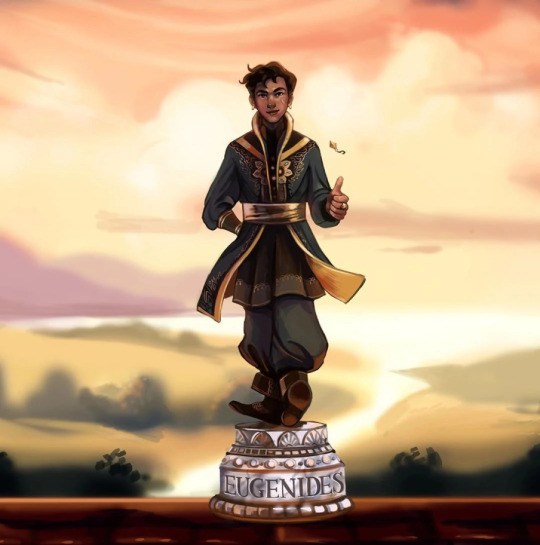
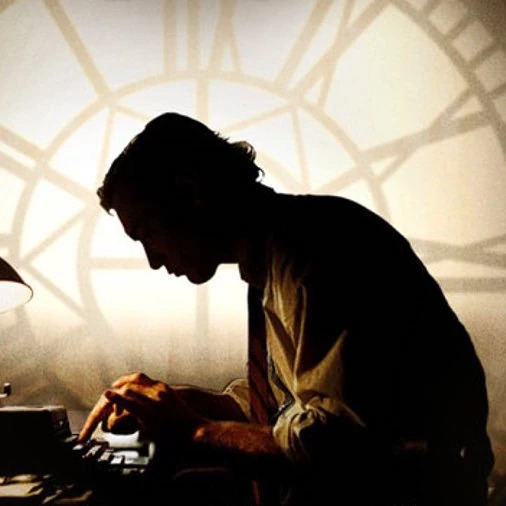
Eugenides Propaganda:
the entire plot hinges on a detail he lets the reader (and every other character) assume is true. I don't want to spoil it because it's a really fun reveal but he is lying from the first second he appears on the page and you can't trust him to tell the full truth about ANYTHING related to himself and his goals. he mostly does it to keep his advantage and not have other characters be suspicious of him but it's just so fun when you realise he's been lying the whole time
Lemony Snicket Propaganda:
(I would like to preface this by saying that Lemony Snicket is the author's pen name, not a real person, and he exists as a character in-universe as well as being the one in-universe who writes the books!) I'd say he's unreliable because he spent time collecting information about the Baudelaire kids and then... wrote books about it. He has no idea what any of their dialogue actually was, what they were thinking, or even the whole plot, he's just doing research into the incidents and then filling in the gaps to make it a story. What ACTUALLY happened to the Baudelaires? Nobody really knows for sure
While the Baudelaire siblings are in potentially life threatening danger, he will randomly start talking about his own life and just leave the siblings hanging. For example, once Count Olaf was threatening to kill Violet, and then Lemony randomly began talking about how he met the love of his life at a costume party. This man CANNOT stay on topic. Usually when a new character is introduced, Lemony tells us right at the start that they’re either going to die or that the Baudelaire siblings will never see them again. Foreshadowing is not subtle in these books. CONSTANTLY emphasizes how miserable he feels while writing these books. At one point he admits that he had to put his pencil down and go cry for a while because of how sad it made him. Once he filled an entire page with nothing but the word “ever” to emphasize how dangerous it is to put forks in electrical outlets. He also repeated a paragraph about deja vu later on in the book to give the reader deja vu.
#lemony snicket#a series of unfortunate events#asoue#asoue books#asoue netflix#eugenides#queens thief#queen's thief#the queens thief#the queen's thief#megan whalen turner#unreliable narrator battle#unreliable narrators#polls#finals#this is gonna be a coughing baby vs hydrogen bomb isn't it.
2K notes
·
View notes
Text
a weird thing about Jean people rarely talk about is that the bitch just sometimes lies lol
there is his "no one is married in Revachol" line (while there are several married couples in the game and jean literally stands right next to the married woman at that moment)
But such occurance isnt not an only one. There several instances where Jean overstates the issue or omits the truth
anothee infamous example of this is in the timeline where kim got shot and jean claims: "kitsuragi is barely clinging to his life!!" despite the fact that jean had visisted kim in the hospital before knows that his condition is stable. To continue putting blame on harry for kim getting shot he also conviently does not mention the fact that kim was upset at JEAN and not harry
anothing thing I found is that jean tells different things depending on how harry responds
If harry is evasive with his answer:
YOU - "I thought the killer would be underwater. He wasn't."
JEAN VICQUEMARE - "Ha-ha-ha, ho-ho-ho." He grabs his stomach in mirthless laughter. "Underwater killer. So funny, Harry. Thank you for fucking me."
JEAN VICQUEMARE - "Thank you for destroying 45,000 reál of police property that's coming out of *my* payslip. You know that, right? You're gonna get fired. And I'm gonna pay till I die..."
JEAN VICQUEMARE - "It doesn't matter." He exhales to calm his breathing. "Your badge, Harry. Show me your badge."
But If Harry is truthful its:
YOU - "I drove it into the ocean when I was drunk."
JEAN VICQUEMARE - "So *refreshing*. He just admits it. Thank you for your honesty. Thank you for destroying 45,000 reál of police property that's coming out of *everyone's* payslip."
JEAN VICQUEMARE - "It doesn't matter." He exhales to calm his breathing. "Your badge, Harry. Show me your badge."
Jean choses to emphasises different things depending on circumstances.
Harry's evasive answer gets Jean annoyed so he is emphasizing *his* suffering and harry being *fired* to make him feel additional guilt.
In the second case Harry tells the truth so Jean is more reasonable. Now its *everyones* payslip. He still wants Harry to feel guilt but now its a lot less drastic.
There is also a line when jean claims that "harry is the reason why we have to take sensitivity trainings" and like.im sorry but this is such a fucking bullcrap. harry is the main reason?? really? what about mack and chester? lets be honest the reason why they are taking these trainings is because cops in their precinct are fucking assholes including jean
TL:DR jean is very very very emotionally-charged unreliable narrator. jean's lying (or exaggerating the truth, if we are being nice) is a pattern and not just isolated occurances
359 notes
·
View notes
Text
About Brainwashing in Danganronpa
Hello to all 3 of the people who see this account. A few months ago, I made a thread on hit website Twitter dot com about brainwashing in the Danganronpa Series. I discussed where it came from, how it works, and how the brainwashing of class 77-B was never a retcon. The thread got a lot of attention there, even getting a "debunk" on other hit website Reddit dot com (lmao). Due to that, there's been a lot of responses and questions. Since I can't really update a Twitter thread, I decided that I'd make the Ultimate™ Brainwashing thread and hopefully dispel any information on the subject while making my original points more clear and covering things I failed to cover. So here it is: Brainwashing in Danganronpa, how it works, where it came from, and how it was intended from the start. (a 🧵 except not really) *Massive spoilers for Danganronpa Zero, Danganronpa 2, Danganronpa Another Episode, Danganronpa Togami, and Danganronpa 3, as well as the series as a whole*
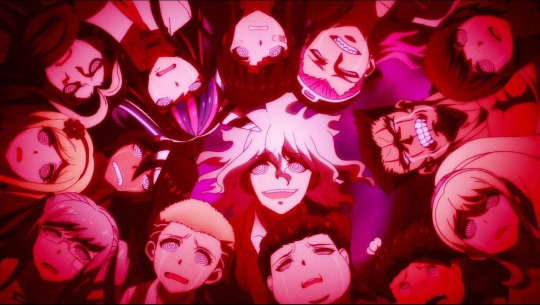
Danganronpa Zero: First Sighting
Brainwashing has its roots all the way back in the second official entry produced in the series, Danganronpa Zero. During the story's events, Ryoko comes across a secret cult made up of students from the reserve course. They're seen staring at a strange video, seemingly turning them and turn them into mindless zombies.
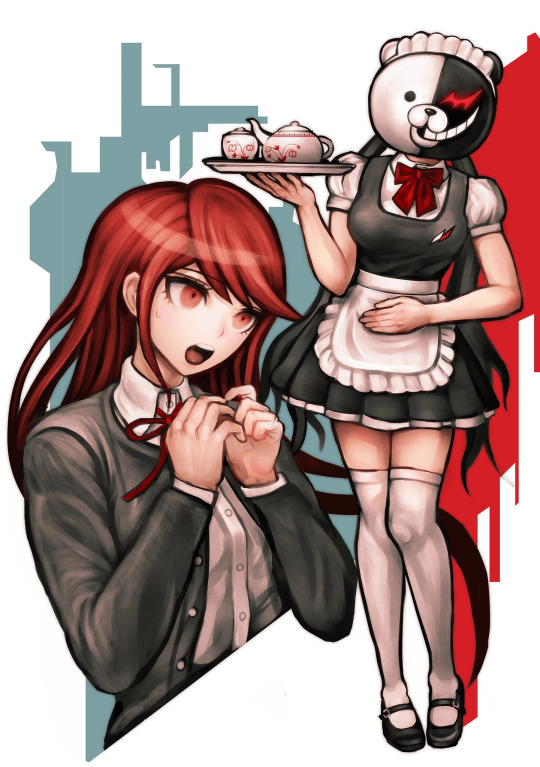

The video depicts members of the student council killing each other. Ryoko is stunned while watching it. She can barely look away, but eventually through force of will she does. This same video is later used to convince the reserve course to rebel.


The way it's described to work is that it uses their “pent-up emotions,” implying that their emotions played a role in its effectiveness. It's also worth noting that the novel itself refers to what is happening as brainwashing, making this objectively the first depiction of brainwashing in the series right from the second entry.
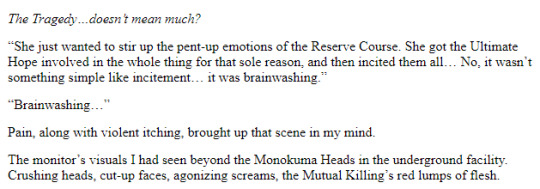
Danganronpa 2: Now it Gets Dubious
Our next instance of brainwashing comes from Danganronpa 2. The concept is brought up multiple times, such as when Makoto states that the Ultimate Despairs were brainwashed or how the Neo World Program is good at treating brainwashing, though the details of what brainwashing actually means in this context are kept vague.
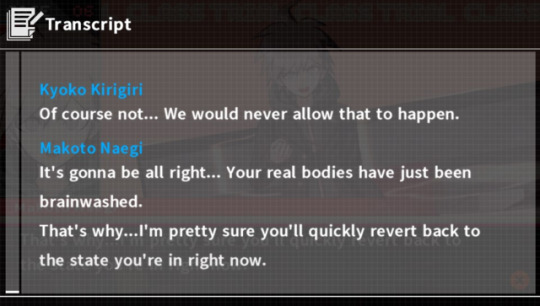
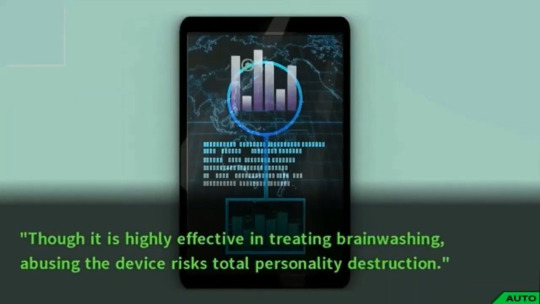
It's also worth noting that Danganronpa 2 was being written around the same time as Danganronpa Zero and Kodaka wanted concepts from the novel to appear in Danganronpa 2, likely so readers would feel validated. This is why things like Izuru Kamukura and the reserve course play huge roles in Danganronpa 2, it's not too much of a stretch to say that the same applies with brainwashing. One detail we’re given about the brainwashing is from Monokuma, who states the Ultimate Despairs were brainwashed by Junko taking advantage of their feelings. Specifically love, hate, grudges, and "anything really". If that sounds familiar, it’s because that’s exactly how the brainwashing video from Danganronpa Zero was described to function, using their pent-up emotions.
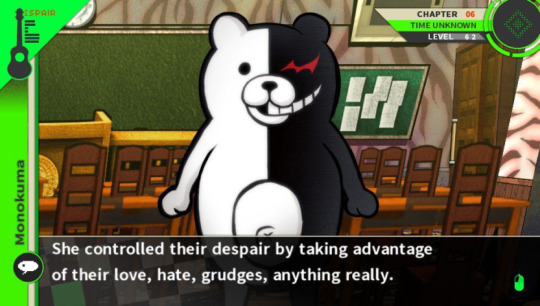
I should mention that Monokuma and Junko are known for being unreliable narrators who often stretch the truth, exaggerate things, and use hyperbole to manipulate people into believing their narrative. Monokuma describes the Ultimate Despairs as “nothing more than Junko’s limbs”, which contradicts the existence of characters like Nagito. Who, while in his despair state, did not work with Junko nor did he look up to her (at least in the normal sense like the other Ultimate Despairs). In fact, it would have been impossible for them to really obey any of Junko's orders as Ultimate Despairs because Junko was trapped inside of Hope's Peak with minimal connection to the outside world. This isn't a definitive "Monokuma is lying" statement, but just note that his word isn't 100% reliable. Meanwhile, someone like Makoto who outright mentions brainwashing, is a much more reliable source.
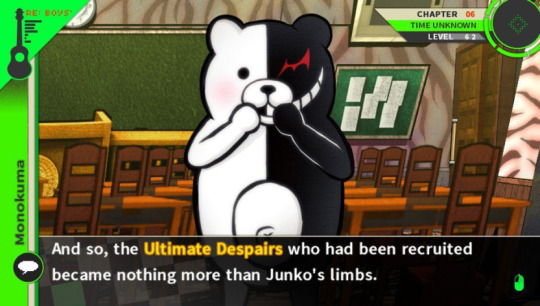
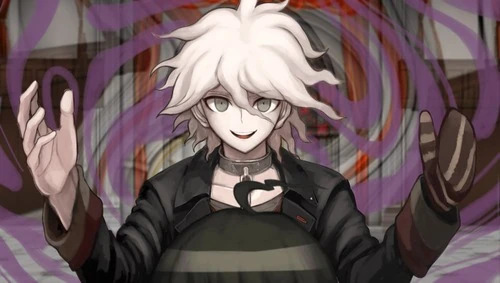
Danganronpa Another Episode: More Brainwashing! (kinda irrelevant tho...)
The next time brainwashing is used is in the next entry, Danganronpa Another Episode. Though its purpose in this discussion isn’t the most useful, as the brainwashing is caused by Monokuma helmets, which don’t have their functionality explained. I figured it was worth mentioning and describing at least, as its another example of brainwashing at least.
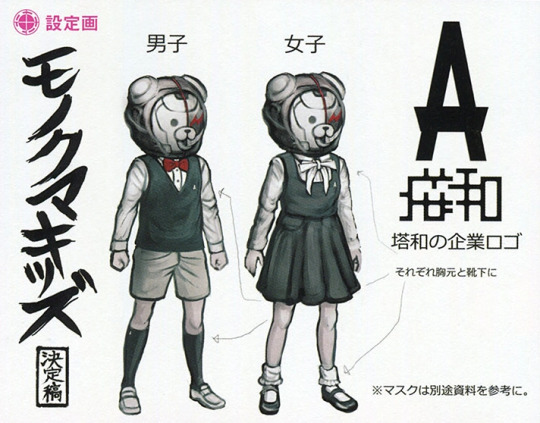
I did figure it was worth adding how the brainwashed children act. They obey the Warriors of Hope’s every command, as if they have zero control over their actions. This is different from how the Ultimate Despairs act, who still some free had free will after presumably being brainwashed judging by the actions of Nagito, who is also in this game.
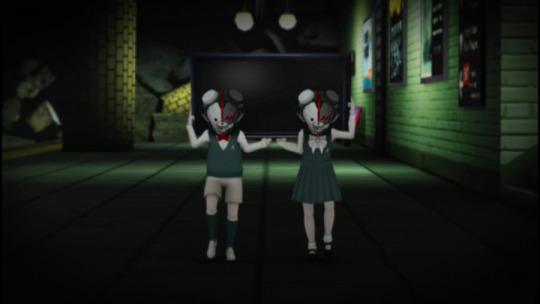
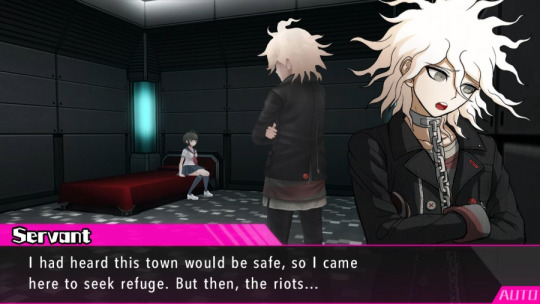
Danganronpa Togami: I Hate My Life
Okay. As mixed as my opinions are on this novel trilogy, it does feature brainwashing. In fact, it might feature one of the most detailed and important descriptions of brainwashing in the series, and even outright CONFIRMS that class 77-B were brainwashed (sorta).

"Hey um... Tumblr/Twitter user Pengu... what do you mean by 'sorta'?" Well my uninformed reader who I guarantee has probably never read this book, there's a twist. I regret to inform you that the canonicity of Danganronpa Togami is rather questionable, as it depicts an extremely unreliable narrator’s warped viewing of events due to this thing called the K2K system, which means not everything in the novel is meant to be taken literally or at face value.
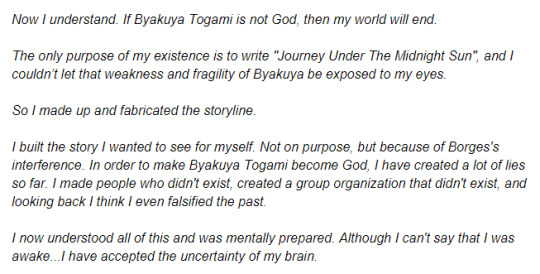
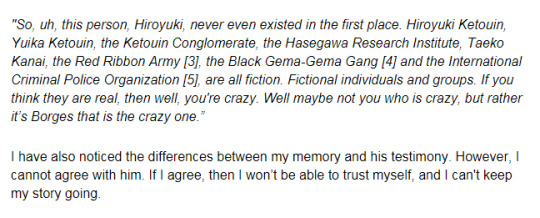
This doesn't mean that everything should be discarded or immediately dismissed however. This just means that we have to use our brains a little and decipher what the hell Yuya Sato was cooking when he wrote this novel trilogy. In the novel, we discover the existence of the elusive despair novel. When read, the novel will turn the reader to despair and inflict them with the despair disease. This novel is what's used to plummet the world into despair, as well as being what caused the class 77-B to become the Ultimate Despairs. There's no known ways to avoid it, once you read it, it's joever. 😔

As I said earlier, the events of Danganronpa Togami can’t be taken literally. Due to this and prior context, we can safely assume that the despair novel is most likely the K2K's warped idea of the despair video from Danganronpa Zero. Instead of being a book being read that brainwashed people, it was a video being watched. What makes me so sure? Well let's look over the similarities. The way the despair novel works is that it uses cruel words to overload the reader with negative emotions, causing them to snap and turn to despair. That sounds almost exactly like the despair video, overloading the viewer by manipulating their emotions until they turn to despair.
However, a major difference comes from the fact that Danganronpa Togami confirms towards the end that the despair novel doesn't literally brainwash people, acting as a placebo and an excuse for people with despair to use.
However I don't believe this suddenly breaks the connection to the despair video in Danganronpa Zero. All it shows is that the novel doesn't create despair, which is something we already established with the brainwashing video. It doesn't make despair, it makes it stronger. Whether it be via the disturbing imagery on the screen or the words on a page giving you an excuse, all it does is amplify despair. Basically it doesn't make despair come out of nowhere, it incites it. This connection's a little bit of a stretch but I'll bring it up anyways. The technology used in the despair novels was originally to bring hope. (Take notes, it will probably be important assuming you buy this connection.)

Essentially, the despair novel works in a similar same way as the despair video, but instead it’s a book and you read it instead of watching it. This means that class 77-B and the rest of the world were most likely brainwashed via the despair video, and that is what caused the class to become Ultimate Despairs.
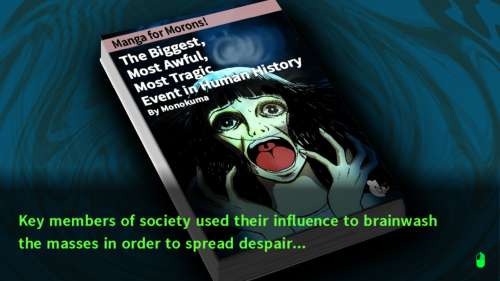
Danganronpa 3: The One People Really Don't Like
And all of this brings us to the most detailed yet controversial usage of brainwashing: Danganronpa 3. Many assume that the anime’s usage of brainwashing is a retcon, contradicting the words of our holy savior Super Danganronpa 2: Goodbye Despair High School. However, I’d like to debate that. In fact, I'd like to finally put a nail in the coffin of this really stupid debate and finally show you that Danganronpa 3's depiction of brainwashing is exactly how it has always been described.
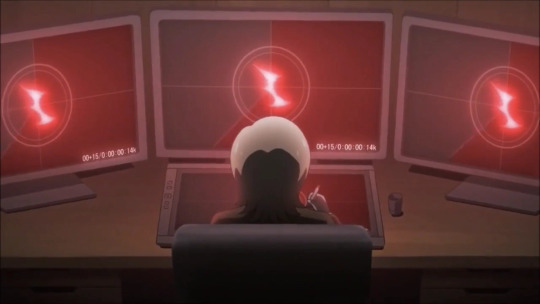
In Danganronpa 3, we are introduced to Ryota Mitarai and his anime. Using the power of subliminal messaging, it heightens the viewer's emotions and makes them more powerful. What was once a slightly emotional scene is now a complete tearjerker fully capable of tearing at the viewers heart strings! While he acknowledges that there are unethical things that can be done with this technology and it's technically brainwashing, his goal is to use this technology to make the world a better place, even if it can be dangerous. If that sounds familiar, that's because it's what Hope's Peak tried doing with the despair novel in Danganronpa Togami. Though I'll admit, this single point is a little bit of a stretch as there are differences. I just figured it was worth at least a mention.
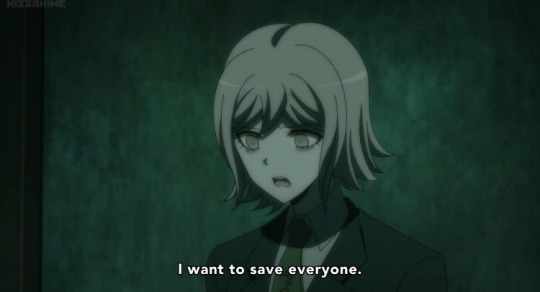
Using her analytical prowess, Junko gets a rough understanding of how the technology works, so she develops the despair video, featuring the student council killing each other overlayed with subliminal messaging technology to make the despair felt while viewing the video stronger.
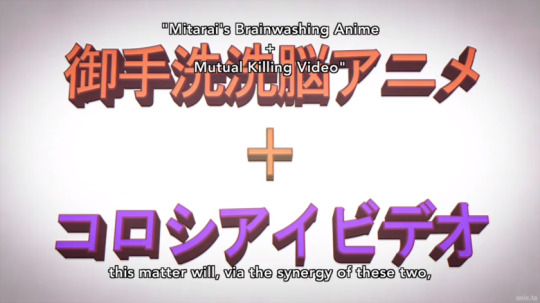
The video works on Mikan, however Junko fears that the video may not be powerful enough to fully go through with her plans due to not understanding the technology nearly as well as Ryota does. Because of this, she forces Ryota to create a better, more powerful despair video. A despair video v2 if you will. Junko’s fears weren’t unfounded, as we discover that Chisa had the mental fortitude to resist the despair video, similarly to how Ryoko was able to resist the same video in Danganronpa Zero. This is exactly why Junko needs a more powerful video, one that she knows can’t be resisted.
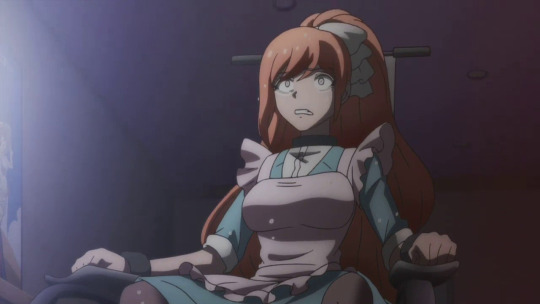
"Ermmmm, Tumblr/Twitter user Pengu, how come Ryoko and Chisa are able to resist the despair video but Mikan and nobody in the reserve course could?" Good question, the answer is pretty simple. As mentioned before, the video takes advantage of the emotions of the viewer. Mikan is already pretty weak minded, so there wasn't much issue in controlling her. The reserve course already hated Hope's Peak and would take any reason to hate them more, so a video that shows them the sins of Hope's Peak would affect them as well. Ryoko and Chisa have no connection to the reserve course however, and neither are particularly very weak emotionally. Ryoko has the analytical prowess of Junko and Chisa is just a very strong willed person in general, and paired with Junko's lack of knowledge about subliminal messaging when creating the video, it's pretty obvious it wouldn't be that effective on them. All the more reason for Junko to force Ryota to make a better despair video.
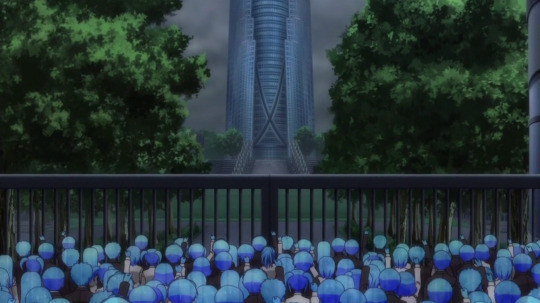
The despair video v2 that Ryota is forced to make comes in the form of Chiaki’s execution video, where the stronger subliminal messages paired with witnessing the representation of the happiest moments in their miserable lives and their closest friend suffer makes class 77-B unable to resist. Ultimately this causes them to finally snap, being overloaded with despair, and now they turn into the Ultimate Despairs. (side note this is so freaking cool idc what anyone else says)
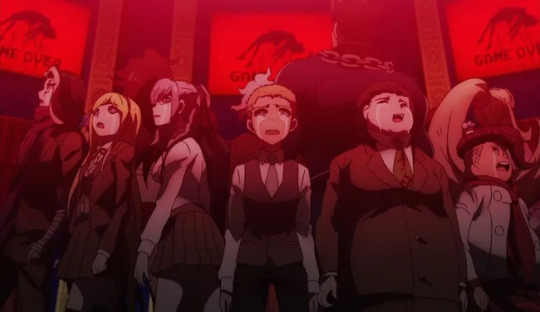
This resembles Monokuma’s explanation from Danganronpa 2. Junko used class 77-B’s emotions and years of getting closer against them to turn them to them to despair. Now featuring the added context of her using the video designed to manipulate people’s emotions. Also as @jelimore pointed out, Junko leading the class to Chiaki's execution itself was manipulating them. This depiction of brainwashing fits perfectly with the information provided throughout the series, even down to the little details. It’s so close in fact that I can say without a doubt that Danganronpa 3 did not retcon anything. “But Tumblr/Twitter user Pengu, that isn’t how the video is shown to work during Hope Arc. Therefore it actually contradicts previous entries and is inconsistent!" To that I say, you’re correct! ...at least about the hope video functioning differently, but that doesn’t make it inconsistent. The hope video behaves pretty differently. Instead of overloading the viewer with negative feelings, it simply just shows them a repeating video loop that turns them into a mindless zombie, likely caused by even stronger subliminal messaging. The people affected can also snap out of this state with some time, as seen with Aoi.
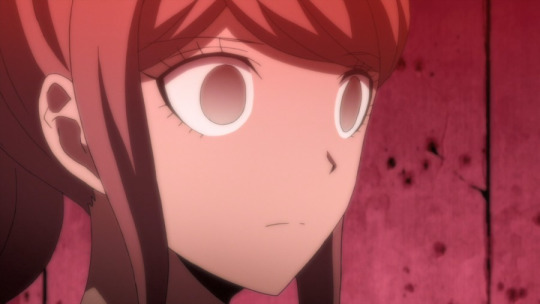
The reasoning for this is actually pretty simple, it’s just different technology entirely. It’s stated that the hope video was developed later on after the despair video. If anything, it behaves very similar to the Monokuma masks from Danganronpa Another Episode, which we also already established uses different technology. The hope video doesn’t contradict the despair video at all because they both use completely different tech. This can also be seen with how the despair video uses subliminal messaging, meanwhile the messaging in the hope video couldn’t be further from subliminal. There is no inconsistency, just two different things.
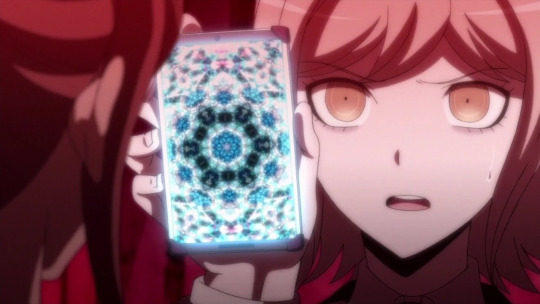
The reason the hope video needed to be broadcasted everywhere was so that since it would be airing everywhere, nobody would have time for the effects to wear off or resist it. This would turn the world into mindless zombies who obey every command, similarly to the Monokuma kids. It's just that now they don't have to force bulky helmets onto everyone.
Debunking Common Arguments
With the hope video out of the way, I think it’s very safe to assume that not only is the despair video’s functionality very accurate to previous descriptions, it’s also always been the reason for the brainwashing of Class 77-B, long before Danganronpa 3. Even if you disagree and think the cause of brainwashing was never explicitly mentioned in Danganronpa 2, there's still the fact that Danganronpa 2 outright says it was brainwashing. So even if a video wasn't the direct cause of it, them being brainwashed was still always intended (though given the context and the fact the video was introduced in a tie in novel for the game, I'm certain that it was always the culprit). Many point to this line where Kazuichi asks why they became the Ultimate Despairs and Makoto says he never got an answer to debunk this. But... this doesn't change anything. He asks why they became Ultimate Despairs, not how. And this is completely ignoring the fact that Makoto clearly has done his own digging into the situation, he discovered the Remnants of Despair were hiding among Future Foundation after all. The Future Foundation had access to brainwashing videos, they found them, so of course Makoto is going to know about the brainwashing. What Makoto is saying here is that he doesn't know every little detail, all he knows is that they were brainwashed. I wrote a bit more about it here, but there's nothing contradictory in this scene.
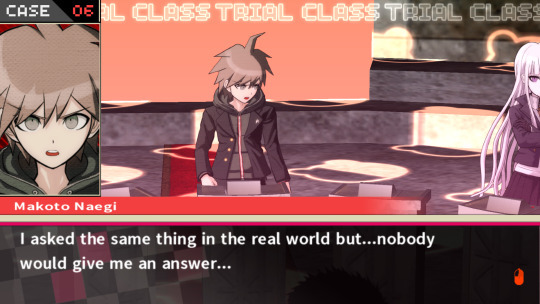
Many also point to Mikan stating that it was her many human relationships that led her to being the way she is. Once again, this changes literally nothing. Mikan was the only one of the remnants who actually knew Junko, she was the only one who spent time with her because she was the first subject. This is why she gets more attached to her, and even why she'd believe what Junko would tell her when they spent time together. Monokuma also says that Junko used "hopeless methods overflowing with charisma and humor" to control the masses. I don't even know why I have to address this, but this statement is so vague you can interpret it as a million things. Like for example, this is how she got Ryota to work for her. While pretending to be Makoto to manipulate the people in the trial, Junko tells them that they all became Ultimate Despairs while coming into contact with her at Hope's Peak and they were subjected by her terrifying influence. Again, ignoring how vague "terrifying influence" is, this is literally Junko trying to LIE AND MANIPULATE them. This is quite possibly the worst example you could have used because we know for a fact that she is lying to them while pretending to be Makoto. There's other examples of Junko trying to manipulate them, like mentioning how everyone hated them and their all Ultimate Despairs at the end of the day. But that's just what this is, manipulation. You would think that the "Junko manipulated class 77-B" crowd would understand that saying "everyone hates you but I saw your potential" is literally manipulation 101. She even states that Izuru killed the entirety of a student council, which we know for certain is a lie because Danganronpa Zero (which came out before) says otherwise. Some say that the brainwashing turned them into mindless zombies and eliminates all blame from their actions. While I would agree that it does make them less at fault, they still have the ability to make choices and still have free will. Their original personalities haven't been overwritten, their brains were just rewired to crave despair. They're still each their individual person with their own ways of feeling despair, and characters like Chisa and Nagito show that they regain their free will to an extent. I also wrote more about that here, LOL.
Conclusion and Final Thoughts
This whole debate stems from people misunderstanding Monokuma’s words and going along with the popular interpretation, which turned out to be wrong. Whether you like the use of brainwashing or not, it objectively isn’t a retcon as it's been developed ever since Danganronpa Zero. Personally, I love the use of brainwashing. I think the way it's developed throughout the series and its usage in Danganronpa 3 is super interesting. If you disagree, that's fine! Heck, if you choose to headcanon that Junko manipulated 15 individual teenagers into all becoming despair hungry terrorists capable but ending the world and fighting off every military in the world in less than a year, that's cool too! But the truth is, Danganronpa 3's brainwashing is canon and it's also not a retcon nor does it contradict anything. Contrary to popular belief, Kodaka was involved with the writing of the anime. He provided a large draft and outline of the plot and oversaw its development. He produced the anime, he did his homework, the team even played the games to prepare for writing the anime. He knew what he was doing. I'm sure if Kodaka intended for them to all be manipulated one by one, that's what he would have went with. All information implying that it was manipulation is very few and far between and questionable at best, not to mention outweighed by everything implying it was brainwashing. Mind manipulation stuff is not new in this series, its been around since the first game and brainwashing was established in literally the second entry ever produced. Whether you love it or hate it, think it's the best thing since sliced bread or the death of the series, brainwashing was the answer the whole time. Some people just never noticed it, and instead of acknowledging that they were wrong, they stuck with a headcanon that they believed so much and jumped to the conclusion of "retcon". I hope this mega post managed to inform some people, maybe change some minds too. If you still don't buy it, then I guess there's nothing I can do. Thanks for reading all of this though, I tend to yap a lot about this franchise lmao.
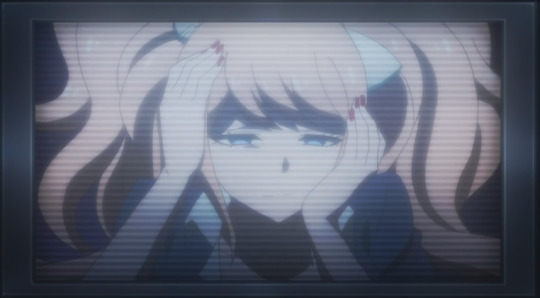
#danganronpa#danganronpa 2#danganronpa zero#danganronpa 3#dr0#dr3#dr3 anime#danganronpa goodbye despair#danganronpa 3 despair arc#dr2 goodbye despair#super danganronpa 2#danganronpa anime#sdr2#danganronpa another episode#danganronpa ultra despair girls#udg#danganronpa togami#danganronpa analysis#ultimate despair#remnants of despair#junko enoshima#ryoko otonashi#chisa yukizome#ryota mitarai
404 notes
·
View notes
Text
On A(yin) and Unreliable Narration - or, "Did They Hate Him, Really?", the Story of a Depressed Man
One of those funny things about Lobotomy Corporation is that, just like many, many games out there... it puts you into the shoes of the protagonist. Almost literally, as it's designed to look like a player insert game.
But, see... it isn't.
The similarities are - at the start - that you seem not to have a name, you can't see what you look like, there's a character helping you and explaining the world, you're amnesiac, and you're suddenly given something big to do.
Those fall apart really quickly.
(Spoilers/references to endgame LobCorp, Ruina and Limbus as well in the post.)
Firstly, Angela tells the player their name. Or rather, that you are now called "X." She does not give you an option of which name to input, just as later on, Faust does not give the option to name "me" in Limbus Company and the player character is named "Dante." Both times, that decision is taken out of the player's hands.
From this moment forth, you are not playing "you," you are playing as a character that the developers have named, characterised, and already decided on. And this shows itself through all of the choices they take from then on, and the story they take you on.
Just focusing on "X," we don't often get to see what he's thinking and feeling himself. The very, very few times are usually either a multiple choice question, or right at the very end - and no matter what, he doesn't speak very much. He uses short sentences... from what we can see, at least.

This is on Day 5, but... you get the idea. X doesn't really say much more than this at a time.
But- wait. Look at that. Here's something interesting that I loved picking up when going through Persona 5-
The fact that each one of these comments is simply a sliding scale of the same thing.
You, as the player, literally cannot have X say to Angela here "I've been having a great time! Absolutely loving it, thanks." Because that... isn't how X feels.
The truth is that as of Day 5, X has only got memories of the past five days. His entire life has been one of managing a facility of death and fear, with everyone looking to him for guidance. No shit he's going to say that his life has been awful.
Which handily already gives him defined personality characteristics that do, actually, stick with him all the way through to the endgame.
This is someone who does not enjoy being in a position like this. He does not enjoy seeing wanton death and destruction. He does not like being in charge, and responsible for everything.
All of which neatly destroys the player's ability to insert themself into the Manager's role as themself, and take control. This is his company. You are playing the managerial equivalent of a first person shooter with your character on mute most of the time, but everyone else can (effectively) see and hear him as his own person.
Which leads on to the biggest thing:
How do the others interact with him? How do they see him? Does he say things that we don't hear? What are their opinions of him?
Now, the ones we get to see X through are really just the Sephirot, Carmen (to a degree, through memories) and Angela. There's the Keter, but they're a special case.
It's basically impossible to talk about "Manager X" without looking into his past as "A, the Founder of Lobotomy Corporation" - or, rather, as we find out on Day 50, "Ayin."
Because each of them are simply one part of a whole, really. And the simple fact is that the only reason I tend to differentiate them with calling the character from the start "X" and the one later on (from around the mid-point onward) "A" is that this way, we know which point in time we're talking about.
All of them are however, ultimately, all Ayin.
"It's all Ayin, all along?" "Always has been."
Now, the easy part is to say "the Sephirot hate Ayin!" and... to be honest, that's kinda true. They do not get along. Any of them- no, Hokma, we're not talking about you, you're an outlier and should not be counted for this. Sit your gay ass down.
Truth is, as Kali/Gebura said, after her suppression:

ID: "When we first reawakened in metal, we could feel the exact moment our final breath stopped, lodged into us like glass shards."
So, effectively, they're like angry ghosts full of resentment that have never been able to move on from that unfinished business. And, unfortunately, all of that unfinished business revolves around Ayin, the character we're playing as. No wonder they're all angry at him! and that's not even taking into consideration the issues they'd have had before they died!
So: Malkuth is mad because her resentment stems from desperately wanting Ayin's praise and attention as Elijah, to the point that she pushed herself further than she should have, did something he hadn't given the approval for (but Carmen did), and died horribly for it, with him not able to face something horrendously awful happening to someone he'd tried to say "don't do that" to.
All she can see, however, is how she had tried her hardest to be noticed and still got ignored. That's where her meltdown comes from.
Yesod's comes from, basically, seeing the aftermath of Elijah's (awful, awful) death and gaining a level of OCD over it. I don't use that term lightly here; he gains an overly stringent obsession over rules and regulations, and believes that something may have gotten onto his skin, leading to him self-harming himself in order to get this off (and it is not there). Ayin, not having any surety that this is all just in Gabriel's head, orders an invasive examination to ensure that nothing infectious is actually going on. Remember: this is the City. They are in a laboratory. This is very plausible.
However, there never was anything of the sort, and Gabriel is simply more traumatised than ever. Both of them simply have to live with that now, and Yesod's meltdown comes from trying to - as he had as Gabriel - push down his grief and despair until it simply exploded.
Hod was a teenager at most when she was working for the lab in its original form, a nervous girl who Ayin warned - quite harshly, even! - what she was getting into with them. Carmen says "Don't be too harsh on her. She's amazing to be here at such a young age!" and the issue gets waved over like that. By the time people have died because of the experiments and they're handling abnormalities, however, she reaches her breaking point and... effectively calls the cops on them by saying that they're doing things that are Wrong, and because of that, the entire lab gets destroyed. Ayin remembers reading about her having died in the newspaper, and "never wanted [her] to die in misery, like that nasty tabloid article gossiped."
What is implied is that Michelle lived long enough to know that she'd made a massive mistake. She likely knew that instead of just having the company shut down and the research stopped, the Head was calling Arbiters on them. Perhaps whoever she told went "thank you for the tip-off, we'll deal with it" and when she assumed there'd be no bloodshed, she was corrected in her mistake. Whichever way, she knew what would happen, and she committed suicide because if she'd not wanted to face the things that she'd left behind, she couldn't live with the consequences of what she'd done.
Hod's meltdown happens because she's full of regret and she cannot move forward past the desire to be someone who hadn't been so weak to do such a thing in the first place. She wants to see herself as better than she was - but without having faced what she needs to be improving from.
Tiphereth's regret is, quite simply, that she doesn't understand why Enoch chose to die. The fact that Tiphereth B keeps malfunctioning for the same reason that she could never understand Enoch - that he asks questions about the meaning of existence - makes this harder on her. As Lisa, she never liked Carmen, and wanted to live in the moment, enjoying life as it was without thinking about it too hard, really. Enoch died, and she took it out on Carmen. We never really see what Lisa thought of Ayin himself directly, which places any ideas of how she saw him into headcanon territory.
Without Enoch, and knowing that he keeps coming back and hoping for something better, she ends up asking some of the same questions - "what are we doing all of this for?" - during her meltdown.
Chesed's is a cycle that's very easy to see how it's repeated with Angela. Ayin is told straight off by Carmen “He’s a bit pompous, so don’t believe everything he says." (Direct quote). Daniel continues to work with them, all the way through everything... right up until Garion comes along and terrifies the hell out of him into releasing abnormalities onto the lab, killing almost everyone.
Chesed's effectively forced to relive this over and over again via Angela telling him to do things that'll get the employees killed, keeping him in line with threats. Of note is the fact that with Carmen, Garion, and Angela, all of them hold levels of power over him. The phrase "No matter how great you may be, you will always be in the palm of my hand" is a recurring theme for him, and no wonder, when his trauma is based in the feeling of being used to hurt others no matter what he feels about that.
The other part is that when he truly needed Ayin to listen to him, during the Head's destruction of the lab, Ayin shut the intercom on him.
Gebura's is easier to quantify, much like Tiphereth's; she wanted to protect people, and her final moments that were etched into her head in the robot box form were of her rage at not being able to do so, and just wanting to lash out.
Hokma... okay, I will include Hokma here, because Benjamin's big regrets and resentments are that he didn't stop Ayin when Ayin went too far. He didn't see the signs and red flags saying "this man is not okay!" because he desperately wanted him to be okay. Because of that, he ignored his misgivings until he couldn't take it any longer, and left.
Binah is... interesting! At first, nothing seems personal. Other than the eternal torture, y'know. But then she does state that she sees herself and Ayin to be similar - in that they are both the kind of people who will shove their entire conscience away and do the necessary evil regardless. She also sees Ayin as the weak kind of man who can't actually change anything.
I bring up all of that without any of the post-suppression personality changes specifically because there's still an easy way of... seeing Ayin as this awful person, because we see him mostly through the eyes of people who hate his guts, in their worst possible moments. Which is easily enough to make people playing the game have a bad first impression of him, and then even when they're going through the core suppressions and winning, it's like "yeah, but he did all those things!"
I mean, Ayin was bad enough that he caused his best friend to walk away from him! When the things said best friend can be seen saying his his suppression are really, really gay. Like, so gay. Makes him seem like he's trying to constantly say "I want to be married to you" gay.
Thing is, Gebura even said it up there, quite plainly: they're stuck in their traumas. Their resentment. Their worst possible feelings.
And as everyone should know, no one is their worst possible self all the time!
So, let's go back over this. This time, taking everything they're saying with a pinch of salt because they're biased unreliable narrators. All of them. And this time, not in order.
I'm going to start with Chesed, because I feel like he has the most impactful things to say about Ayin as a person, and he goes through what appears to be the biggest 180 in his stance on the Manager in the game.
In fact, let's take a look at a couple of Chesed's quotes before and after:
Chesed [before]: Geez, manager. Do I really have to remind you that [Agent] has gone mad for you to notice?
Chesed [after]: [Agent] seems to be dealing with a mental break. Give ‘em the care they need, manager.
The "entire team wiped out" lines are also along the same lines.
Welp, all my competent employees are dead now. How are you going to compensate me for all this? Geez, how’d you even become the manager in the first place? The whole department is dead. It’s all over.
Compare this to-
Don’t worry about it too hard, manager. I saw you tried your best.
Now. Remember what I said about "no one is on their worst day every single day, except these people who are stuck in their worst traumatic emotional points"?
We see with Chesed a big hint of how this guy felt in his worst moment... versus how he wants to feel, when they've made up.
Which is to say - Chesed goes from blaming the Manager, assuming that he's sleeping on the job and not paying attention at all, to trusting him and being sure he tried his best. Which is a BIG difference!
It also fits with the swap from "Qlipoth" to "Sephirot" in terms of the actual Tree of Life/Kabbalah, in that the Sephirot in the game are positioned upside down at first, and are acting opposite to the virtues and qualities of their points on the tree that they're named after. Chesed is distrustful because he's been abandoned, but once they've come to an understanding, he is the basis of A being able to believe in people again.
And what is that A brings up much, much later on in the game, that Chesed told him?
"That's not all, manager. Carmen trusted in you entirely until her moment of death. Everyone else who remained did too. Why do you think I decided to stick with you until the end? Just look around you now. Everyone gathered here just for you. And they’re waiting expectantly."
In other words - and this is why I started with Chesed - it wasn't just that everyone followed Carmen, but that they all trusted in and followed Ayin.
This is important. Very important.
Because Ayin, as stated, is a very unreliable narrator.
Not just because he forces himself to be amnesiac and only regain his memories bit by bit (as we see with the Memory Synchronisation), and again in Keter) but because any and all opinions coming from "Ayin" tend to come from the Keter. The Keter are all fragments of his fractured psyche, versions of him who had failed to suppress the cores of the Sephirot, and therefore were unable to find the realisations that coming to terms with them would bring.
Abel is only able (ha) to think about how he's failed them all, and how they're forgotten. He's repressing every emotion so that he can't feel anything. He doesn't think he can become better. He's just aimlessly living until he can die.
Abram leads a meaningless existence, having forgotten what he's even been doing any of it for. He doesn't have any courage left, because he's just languishing in guilt. He also believes that no one should have trusted him because all they were there for was Carmen and once she was gone everything fell apart because she wasn't there, and he could neither be trusted nor trust anyone.
Adam... looked into the Well and states that he believes that this is exactly what Carmen wanted. Considering that the Well is the human subconscious and Carmen is the Bucket that Binah talks about, I'd say this is an accurate assessment of the situation here... especially when all future instalments and materials go into detail on how Carmen is encouraging people to distort. That's... basically what Adam's following, here.
So - who was speaking during those flashbacks? I'd say it's plausible that it was Abel or Abram, or a mix of the two, with Adam showing up in how none of the dialogue from the A Team really shows A the Manager going "uh, maybe this is a bad idea?" - Adam is the fervent belief in Carmen to the exclusion of rational sense, taken to the logical outcome when one has been placed in the Time Loop.
Because of that I'd say it isn't just the Sephirot in machine forms being stuck in their worst moments - all we see from Ayin is filtered through his depression as someone who has lost everything and is just... moving forward regardless.
But- let's step back, while bearing that in mind. What was it Chesed said, again?
That everyone had trusted in Ayin. That they'd stuck around for him. Yes, they were all joined together to enact Carmen's will, but the fact was, if they didn't trust and believe in Ayin, they wouldn't have carried on together. And Chesed also states that as Daniel, he'd gone to their company because people trusted each other.
Elijah's problem was that she needed praise, to be told that she was doing well. To be told "good job" sometimes. The problem? That Ayin only realised that maybe he needed to do that far too late. But... she did want his attention. She looked up to him.
Michelle is seen being a nervous young girl, older than Lisa and Enoch but younger than any of the others - so, probably mid-teens at most. The main memories with regards to Ayin interacting with her? Him being harsh and stern... because he was concerned about her. The very fact that she did commit suicide after selling them out to the Head goes a long way to show how badly she felt for that, because she clearly cared about them all a lot. Headcanon territory, but I can see Michelle looking back and thinking "Ayin was right" - and knowing that he was trying to look out for her.
Gabriel, we don't even really see before things go wrong, at all, really. We see what his reaction is to Elijah's death. We see him covering up and hiding his emotions behind rules and regulations. But... we also see how Gabriel very easily brought up his ideas of how to prevent such accidents in future; he clearly felt comfortable enough to do so with Ayin at the time.
Giovanni... is one of those special cases who never trusted or liked Ayin and Ayin didn't really give him a reason to. He outright lied to Giovanni - because he wanted him to die happy, at least. But as A and Netzach they're able to talk things out; clearly, because, as Netzach says after the fact: "But for the first time, I think that maybe it was me who called you." It's also very strongly implied that Manager X/A by this point has a complete understanding of where Netzach is coming from, meaning that they're both on the same page about a lot of things. The very fact that Netzach is encouraging A with "I made it this far, what makes you think you can't?" adds a sense of camaraderie.
With Lisa and Enoch, we see that while Enoch suggested that they called Carmen their new mother, and while we don't see them outright say anything about Ayin... he's the one who's always there to bring them back home. Ayin is. And it isn't Ayin that Lisa's furious with in the flashback; that's Carmen. We don't see Lisa blame Ayin, which could be taken to mean that it never directly happened (as I'm sure Ayin would have remembered if it had).
I feel like it's telling that Lisa, the child who was more "easily frightened," says to the Manager, as Tiphereth, "But you're different, you're supposed to be different!" - as in... she trusts in him more than she's trusted in Carmen, or Angela, or any of the other "adult" figures in her life that we've seen.
As for Enoch... during Abram's questioning, we see Tiphereth say this: "One day, I realized that you were also looking towards somewhere with a clear vision, just like he did." In other words, Ayin was much the same as Enoch, waiting for something better, hoping that something good would happen. The line "Where did we want to go while holding a child's hand?" could even suggest that Ayin was there and present as Enoch died.
We've already covered Daniel up there, but yeah. That guy trusted in Ayin and stuck with him to the end. Someone who encourages Ayin to feel like he's capable of pushing on, because Daniel believes in Ayin's abilities.
We don't see many scenes with Ayin and Kali. Not after their first meeting, when she doesn't know or trust him yet and Carmen tells her that he "always glares like that," basically. But we do know that she literally fought to the death with an Arbiter just to keep him and Ben safe and alive. If she didn't think they were worth it, then I'm sure that she'd have given up by that point, or tried to stay alive herself.
Ben is- well- okay yeah, he extolls Ayin's virtues to the point that it's hardly a joke, especially come Ruina, to say that Ben/Hokma is a walking and talking "Have you heard of our lord and saviour Ayin?" - but I think... that's the thing? Ben is the main one who never needed Carmen. It was always Ayin he was there for. The only one on the team who looked up to Ayin as his senior, rather than her. Several of his statements also imply that he knew Ayin well before the project, as well, and he clearly got that admiration from somewhere, for some damn good reason, and not just because he's gay for Ayin. He was fully capable of walking away when he thought that a line had been irreversibly crossed. And the fact that he loves Ayin to the degree that he does is what brought him back, and enabled him to become Hokma at all.
Binah is a... special one. Because as Garion she never cared about him, and as Binah she still doesn't care about him. She does, in fact, hate his guts and have every reason to, because she was tortured. She saw him as the same as her - in a way that possibly filled him with shame, given how much he's shown to care about others!
However, Binah is shown both post-suppression and in the Keter questioning and also in Ruina to explain that what was going on with her was that she had a conscience. She was simply ignoring it. Pushing her feelings and fears aside, so that she didn't have to face the consequences of everything she did. In seeing Manager A (the player) move past her, she wants to see what he can do, because she isn't sure it's possible, and she... wants to see him accomplish his goal. Binah's outlook is very similar to the City in general, actually, since most people can't afford to pay attention to the voice in their heads that's saying "you should stop now, you're crossing a line you shouldn't. Someone's hurting, and that's bad."
This can also be seen in Ruina, where although the main protagonist and pov character is Roland - who, let's be fair, has a biased and bad opinion of Ayin because of him being the one who was in charge of the light, and also what Angela's said - we do get some glimpses every so often.
Malkuth is the first to bring him up - technically Roland himself,


Angela then interrupts the conversation, unable to bear hearing any of the Sephirot bring up Ayin in any sort of positive way, saying that "I wasn't the one using you. It was him; he used all of you just to satisfy himself" and calls Malkuth's attitude "nonsense."

Note the "still" here! The expectation that they would all willingly lay down their lives for this man who is already dead and gone, fighting to protect what he'd done.

In fact, Binah is the only one to side with Angela and even she is not doing it for Angela's sake, but the same reason she decided to stand with Ayin. As in - she decided that no matter what came of Ayin's decisions, she would watch the outcome. She decided that this was merely another consequence of that, so she wanted to see how it'd play out.
Netzach, here:


Outright namedrops his part of the Seed of Light.

Malkuth bringing up the company's tagline - although she's misquoting it, it sure is the one Ayin came up with - saying it's similar to history. (The video cut off her line, but I'd hazard that it's "you have to learn from the past.")
That's not the last we'll see of Angela and the Sephirot clashing.
The next major time is during the Briah meet-up.


Chesed "But, I don't wanna forget those memories [of the past]. Decided to embrace them instead. So did everyone else here." Gebura "He's right. I don't believe that I failed to protect anything. I could save the life of someone who inherited her will."
And not just that, but something I think of as one of the most important Ayin-related quotes of Ruina:

This is when they've talked to Angela, who's snapped herself away in a huff because she wasn't ready to hear what they had to say.
This, to me, says that no matter that all we see in the duration of the Core Suppressions is gameplay and text floating across the screen...
The Manager is talking.
The Manager, A(yin), talks to them, one on one (since all of the other Sephirot and also Angela are asleep during this time), in private, possibly on a private channel, so that they can vent and let things out... but also so that he can say exactly what he needs to say. What they need to hear at that time.
If anything, I'd say that the things Chesed and Gebura say up there is quite possibly them echoing back the things that A(yin) said to them. "You don't have to forget what you've done, as long as you can move forward." "You didn't fail to protect anything at all! Look at me, listen to my voice, I'm right here!"
Funnily enough - though perhaps predictably, since Hokma is Hokma and Binah never actually met Carmen - those two are the only ones who mostly talk about Ayin, not Carmen.
Hokma brings up that it was Ayin's path that he followed:

Note that he doesn't specify that the world Ayin saw was the same as the one Carmen talked about. It could be implied, but Hokma was pretty specific on not following Carmen.
And then there's Binah. With one of the most interesting outlooks on Ayin in the entire game, I think.



I find Binah fascinating. Binah watches. She observes. Up until the final moments of Ruina, with the exception of the fight for the remainder of the Light.
She wants to see what happens next. Whether that meant the direct consequences of what Ayin himself intended to have happen, or the knock-on effects of his decisions as someone who grew past his ability to look away from his conscience telling him that what he was doing was wrong, who could face himself and move forward in spite of the fear... it doesn't matter.
Binah respects the man Ayin became, because of this ability he grew to have, and she follows his will in a similar-yet-different way to Hokma - both of them following Ayin more than Carmen, and both of them wanting to see the world that he would create - which makes sense, since they're both of the same "layer."
And finally... we have Angela herself, and if I went through all of her journey from revering him to growing disillusioned with him to growing to understand him... I'd simply be rehashing all of the timeline of the games from pre-canon to the end of Ruina.
But-

Angela: Then, if I worked hard to have a kind heart... will he look back at me?

Benjamin: ...Probably. Eventually.
And... although it never happens in Lobotomy Corporation...



Angela hears a voice in the light, as she herself is managing it and ensuring that it works this time.
It's Ayin, throwing her entire opinion of him and his view of her into doubt with five words:
"...I'm sorry. And good job."
Lobotomy Corporation and Library of Ruina are both games of unreliable narrators. It only stands to reason that on this, too, there would be bias.
Ayin created Angela in one of the darkest times of his life, while he was still following Carmen's will with blind faith. He created her beautifully - and yet, she isn't a faithful recreation of Carmen. She never would have been, like Benjamin said. But not just because of her personality.
Her appearance is intended to look just as much like Ayin himself. Her hair has Benjamin's paleness, when both Carmen and Ayin had darker tones of brown or black. Ayin's eyes and posture. The ability to think for herself, feel emotions, care for others...
Ayin put a lot of himself into making her, just as Benjamin said, and as Binah states at one point. She's as much his daughter as anything (even if the comparison isn't a perfect 1:1 here due to the circumstances) and... the two "parents" who were involved in her creation? Benjamin didn't see her worth as coming from whether she'd been born human or machine. And as for Ayin...
Ayin created her knowing that he'd have to torture her. To quote the song Answers from FFXIV: "Tell us why, given Life, we are meant to die, helpless in our cries?" - he knew that he was creating her to suffer. He had already seen everyone he knew and loved die horribly, save for Benjamin (who would leave him shortly after). The Ayin of Day 50 says in one of the pop-up messages that he hopes no one has to die or suffer today.
Ayin, even before he built her, couldn't look at Elijah, forced Gabriel into pain and discomfort to be sure that he wasn't infectious, found out that Michelle had committed suicide while on the run from the Head, was the only survivor of the assault on the Outskirts lab, hearing Daniel and many others die painfully. He was able to steel himself to deal with creating Binah, but - he knew that simply seeing the aftermath of what she'd done to Enoch was enough to end Carmen's spark and kill her, so he had to know that if he gave a machine even part of Carmen's heart or mind, this would make said machine suffer.
I honestly don't think that Ayin hated Angela, or that he truly believed that "a machine should only act as a machine." Perhaps this is headcanon territory, but we hear and see him apologise to her, and tell her she's done a good job at a very specific moment - when she's free, and when she's chosen to do the right thing.
He knows at this moment that whatever she's doing, is purely by her own choice. She's outgrown being "just" a machine - so if that was what he truly felt, then wouldn't it stand to reason that he'd be upset or angry at her not staying true to it?
And yet, he doesn't. There's just the same awkward voice that doesn't really know how to people, saying only a few words, but the all-important ones she's wanted all this time.
To summarise a post that became way too long:
Ayin is someone that the games make it easy to dislike, due to the things he does - however, these things are normal in the City, and the major difference between him and the other Wings is that he was willing (as Hokma points out) to commit sins in order to work toward a better world, rather than be satisfied living in the one they were in.
We can see the kind of person that Ayin in through the eyes of the people who know him best, in what they say and don't say, and also what they choose to do, and how they choose to stick by him even long after he's "gone."
Much of what we know about Ayin comes from biased sources, not least himself, but especially Angela. But once you take what they give us and compare and contrast it all against what we see from the others, you can start to make a full, bigger picture of this one single person...
...which, honestly, fits rather well with the entire point of the Tree of Life being about how one is only able to see a person's (God's) true self via the emanations, or various different parts, all of which are named Sephirot.
79 notes
·
View notes
Note
So, my story's protagonist has an older sister who is a very untrustworthy and unreliable narrator who twists the truth to fit her reality or lies a lot. One of these lies is about their parents. The sister claims that their parents always fought and that their father was abusive towards their mother.
In reality, while their parents did argue, they never got into any divorce-level fights or disagreements. Even if her father does raise his voice, he immediately regrets his actions and apologizes.
How do I show that the sister is not being truthful?
Thanks for asking! Here are some tips.
1. Memory inconsistencies
One way to convey this is to make her story change in small ways every time she tells it. Memory is fluid, but liars often can't keep track of their own fabrications. One time she might say "Dad broke a plate in rage," another time she says he punched a hole in the wall. These inconsistencies may be unnoticeable at first, but when they line up they can create a growing sense of suspicion.
Have her describe the parents' fights in wildly exaggerated terms, like "they used to scream at each other every night," but when the protagonist (or even side characters) remember these moments, they might be much quieter, more normal arguments. Or you could show flashbacks to make the point, like of a scene the parents are arguing about something like finances, raising their voices for a second, but then calming down.
Keep in mind that memory can be hazy and emotional, so even flashbacks can be a little fuzzy—but the overall emotional tone should feel healthier than the sister paints.
2. Use other characters' reactions
Sometimes the best proof that something’s off is how other people react—maybe another sibling frowns when she speaks or an old neighbour fondly remembers the parents being affectionate. Quiet, understated counterpoints like this might not be obvious upon first glance, but the reader will likely be able to put it all together as the story goes on by comparing narrations.
3. Build the lie into her character
Think about why she lies about this. Is it protection? Resentment? Manipulation? Trauma? Showing that she needs to warp reality, whether to feel better, to play victim, or hide her own guilt, makes her lies character-driven, not just plot devices or confusing contradictions. Readers don’t need to like her lies, but this will give a reason to understand that they are a survival mechanism rather than being random.
4. Body language
This might not be visible when the narrative is from the sister's POV, but consider her body language when she talks about it. You can hint that she's trying to believe it herself or that she needs this lie to pass through making it intense, like she's too eager to convince others.
Ex: wringing hands, fake tears that come a little too fast, getting mad if someone questions her version, etc.
She may also overact when she recounts these fights, like dodging eye contact, fidgeting, grinning too widely, or acting too confident as if to compensate or make her words more believable.
5. Catching her lying about other things
Though the reasons for her lie may differ, a person who lies perpetually about one thing is also likely to twist other small things here and there as well. If readers already notice her doing things like claiming someone said something they didn't or playing the victim when it's not justified, they'll naturally question her bigger claims without you needing to say it or make it explicit.
6. Overcomplication
Something to keep in mind is that sometimes when liars are pressed, they may overcomplicate their stories to sound more convincing. If you want, you could have the sister’s stories get more and more dramatic the more she’s doubted, like she’s trying to "prove" it instead of just telling the truth.
7. Contrast her stories with specific, concrete memories
This point depends on how obvious you want to make her lies—but one way you could go about it is not to immediately contradict her when she makes claims about them having fought all the time, but to let the protagonist or other characters naturally recall memories that suggest otherwise. Providing memory as proof rather than direct denial will get readers to catch on.
8. Trust your reader
You don't have to explain the lie too early or correct her in a big dramatic reveal—let it be a sort of creeping realisation. Remember, your readers absolutely have the ability to catch on and connect the dots themselves.
-
Hope this helped!
Previous
#ask#writeblr#writing#writing tips#writing advice#writing help#writing resources#creative writing#character development#writers on tumblr#writers of tumblr#writerscommunity#deception-united
47 notes
·
View notes
Text
I'm genuinely concerned that iwtv (tv) spells out EXACTLY how Louis is unreliable in his narration, but people spin this into what they think unreliable narration more generally means to them, and not what it means to this narrative. Just to be clear here are the ways Louis IS unreliable (If I happened to have missed something feel free to add):
Louis shows signs of forgetting which are normal in people who've endured long term traumatic events. Any relevant pieces of information forgotten are however righted, and sought to be righted.
Like anyone recounting a personal narrative, Louis states how things occurred from this limited perspective and worldview of the personal. He has a personal idea of himself he'd like to get across, much like anyone. He is not omnipotent. But while most might be fine if the person receiving this story interprets their experiences differently, offering to wider perspective, Louis is often very particular about the ways it must be described fitting how he can already perceive it. Which makes for times of there being a rigid perception of events, where broader narrative introspection could've offered a more truthful telling. Though sometimes this actually keeps it more truthful. This character flaw, if you will, is what Daniel is around to challenge, and he's very successful at it, even when his challenging can push in the wrong directions and draw up the wrong conclusions. Bringing up latent memories, and digging out hard truths Louis has long not admitted. At least hitting on something real, in any case. Meaning, for us, the audience, we are still in relatively reliable hands even with this in play, and so are not actually that off from truth when it is being told by Louis, who is intentionally seeking to tell it, even get it. Merely, our narrative is being, in ways, restricted as to how much is being told, and, outside Louis control, obfuscated in its reliance deliberately. (which we'll return to).
To jump off from this, Louis does withhold. He can sometimes tell Daniel something then never explain or have an answer for it he's willing to say. But we see this most apparently in how the diaries exclude certain events. That he doesn't detail much of his time with Armand, especially sexually, is a more subtle way of this. He withholds narratively to protect others, and respect them and their histories from being exploited. Though in other instances he withholds moreso to protect himself from this, and the image he wishes to present to Daniel and thus the world. One could see the act of presenting he and Armand's relationship as, firstly one where Armand is his servant Rashid, but then one of far more affection than it really holds, at this point in time, as withholding the truth as well. One could go a step further and say he does this to preserve a sense of agency and control over his inner and personal life, not just over the interview, but over this relationship as a whole. In a sense, Louis editorializes because the reality of things is beyond what feels his right to tell, and otherwise be endangering to his sense of self to tell. Louis usage of language is another way he keeps a sense of agency, as he can still pick the words he chooses to describe his life, even if his life has been largely out of his control. He can't in ways tell the full truth without giving up something he's simply unwilling to give.
Related to this, how he defends things, or is defensive of things, portrays a distorted idea of reality, but an honest portrayal of his own perspective on it. Most starkly I'd say is his claim to consider himself not abused.
His complicated feelings, especially about loved ones, give rise contradictory statements about people and events. Where he can claim one thing, and likely claim it from his personal feelings about it, but we are then shown events where this claim doesn't exactly live up to itself in every way, in his or others actions.
However, the main way Louis narrative becomes unreliable is through the lies and distortions manufactured into it and the ways in which the interview is undermined by conflicts of interest in it. Louis story is in fact one containing lies, and active distortions of events/thoughts, beyond normal forgetting, because of Armand's conflict in letting the truth be told. Mind though, that by the end of the story, much like [1] these we can presume have all been corrected for. Or at the very least who this information truly pertains to, Louis, is shown to have no interest in questioning that it hasn't been. What is relevant to have been the full truth has all been said.
There's a bit of a cultural thing influencing the interview. By this I mean Louis and Armand together had created a culture of politeness and respect, which discouraged and fought down getting at the heat of conflict, or emotional and mental vulnerability. Setting aside differences. Leaving things unaddressed, or burying issues, making up quickly, and in incomplete ways, as a means of maintaining a peaceful environment, leads to a level of transactionally met falsehood of how either is portraying themselves, especially in relation to one another, playing into what seems beneficial to them, more than what would be confrontational of the truth between them. Armand offends far more aggressively in this, and one can only guess this comes more from a rearing much more solidified in this kind of culture where there is a multitude of rules around maintaining a facade of 'nice' behavior for a presumed benefit of the group. Whereas, even if Louis follows this in some ways, he is more often seen to push against this, actually. (see; 'acting out')
There was a period (post 2x05 especially) where he makes claims about Armand, with no real way to back them, but for the purpose of continually marking Armand as a traitor. So, making purely emotional claims as opposed to knowing he's getting the facts straight. Discrediting Armand, even if he might be telling the truth. (debatable, of course, but I feel the need to include it anyhow).
The only real thing left of Louis unreliability in our conclusion is some residual effects of his doing where things are then left unanswered, and the information to be found in other peoples perspectives, which Louis isn't held responsible to be knowing about. So it's highly doubtful these are to where Louis is ever to be discredited on his telling of things, more that he just simply can't account for everything without betraying himself, and can't be held responsible to what he simply can not have known, or others controlling his narrative either.
To summarize what this all then means is that Louis is not telling any sort of story, at any point along it, worth discrediting, let alone fully, and wherever he was swaying in that direction, past or presently, it has been corrected for, or at least questioned, to where we can draw all the reliable conclusions on it through inference and sound interpretation. Making what we are left with by the end of season 2 the most reliable version of events of Louis personal perspective, even if quite a good sum of it is still left to this inference. It is because of what is left to inference, and what is something outside the realm of his personal perspective, that makes us the more unreliable sources of determining these events. WE are more likely to be distorting it by this point in the story, than Louis is shown to be. Our judgments, can do more impeding on what ends up being Louis honest account, than Louis ever was.
What Louis unreliability is not, is ever entirely dishonest - is ever one making up events, or turning them into something they were not. Everything we are told is a personal account of things that actually happened. It's certainly not one where, by the end, you can point at anything, and claim there's an irreparable falsehood about it. Perspective on events change, but that they had happened and in a sequential way, does not. One might not like or be satisfied with his point of view, yet this changes nothing. Memory is a monster, but Louis', a monster himself, is still real. These are his true memories as he is remembering them.
Beyond that, the more imperative story told here is the emotional one. On this journey of truth telling, Louis is also relieved of being unreliable about his emotions, and in the conclusion, he's living shamelessly for who he is, past and presently. This opens new doors for his character to exist beyond memory. The interview was a journey of self acceptance, and one's fight for having and reclaiming a self. The true take away, frankly, is that Louis got this, and nothing we can infer and interpret otherwise about his truth, where it is left open, can take this away from him.
I guess this is all to say Louis 'unreliable narration' is actually something he works through, perhaps in its realistic entirely (we are always a little unreliable). It's something that gets righted as a major part of the resolved conflicts that happen over the course of the interviews events, as so we, like Louis, are also resolved of this unreliability if we hold it to that same level of being the truth. And that is also if we are inferring and interpreting things left open properly, which is hard to say, even for Louis. That is where all of that 'unreliability' rests on is the things left open to question still, or gain new perspective on, and not that any one part of what we were presented with is falsely constructed. As we have actually gotten it reconstructed out of that.
#iwtv#interview with the vampire#louis de pointe du lac#amc iwtv#long post#also one where I feel I just reiterate the same thing over and over#made this like on a whim so excuse that#Again feel open to add#putting this in the tags because I spell it out clearly as being for something else (agency) but Louis-#does NOT present himself like he does for the purpose of making himself look better. Or whenever he could be (hard to tell intentions) -#it seems to be for this agency I meantioned. Besides I think it's clear he doesn't really hide his faults deliberately#and when brought to his attention in the interview he does accept them as such almost to a fault#this also plays into whatever this one post was saying (which has always been my thought too) -#that as far as Armand goes he is actually being mostly truthful or we would simply have to say Louis conflict is not actually resolved here#Not just with the events of Paris which Armand is telling but with events after and during the interview deciding they are all false leads#to less of any conclusion actually.#Which would be fine if we were ever likely to return to any of it but I doubt it.#Lestat could confirm things are false or we have to accept what Armand was saying on events is true#which I think if it WAS this is particularly interesting for a variety of reasons
68 notes
·
View notes
Text
IWTV S2 Tentative Timeline (Pt2c) - Unreliable Narrators, Armand & the Trial

Thanks for the response to Pt2b, @usuallydeepalpaca-blog! I really want people to talk to me about the IWTV timelines, cuz this show is SO confusing! 😩😭
"I think if you create the timeline with info the show doesn't provide, i.e. Armand was involved from the start, then you're bound to get it wrong."
Absolutely. I fully expect that I got some stuff wrong, which is why I said it's a TENTATIVE Timeline.
I've in no way said it's THEE CORRECT™ timeline, cuz chile IDKWTF is going on. 😅 I openly say what confuses me, questions I have, and how I come to the conclusions that I draw. I'm being as transparent as possible to let y'all know that I DON'T know. 🤷 The show doesn't provide EVERYthing, so I'm just piecing things together in a way that makes an iota of sense to me, following the logic of what the show HAS provided. The only solid details we have are diehard IRL dates, that gave us a time range when certain events can/can't happen. AFAIK I'm working with the same set of details everyone else has, until AMC gives us more info in S3+. And unfortunately, the 2 biggest unknown variables are Lestat & Armand, and to what extent they were/weren't involved in the Trial that got Claudia killed & Louis buried alive.
"saying Armand messed with Louis' memories re: the trial is also something not supported by the show."
The show obvs. wants us to assume that Armand made Louis hallucinate Sam guarding him in the theatre box (thus painting Armand as a "captive" along with Louis & Claudeleine).



Even if Armand didn't use the Mind Gift on Louis, he lied at least twice:
lies by omission: letting Louis think a hallucination of Sam was real
lies to Louis' (& Daniel's) face: going along with the premise that he was Sam's "captive" & Armand sat there the whole time thinking of a way to rescue Louis


And we KNOW this is a lie, cuz Daniel calls it out explicitly, asking how Sam can be "in two places at once," allegedly "guarding" Armand, but ALSO helping to torture Louis in the Wet Room.


Armand never denied or contradicted Louis saying Sam was in either place. Maybe Louis really did misremember Sam being in the wet room--the ONLY one who can corroborate all this is SAM--whom Armand ALSO lies on, throwing Sam, Daniel & the Talamasca all under the bus by saying the script with his handwriting all over it was forged! No honor amongst thieves I guess! 🤣

(Eff Lestat's POV in S3--when is SAM gonna give HIS POV of the Trial?!)
So I'm operating on patterns of behavior, and the logic that if he's deliberately lying about one thing (a VERY BIG THING, actually), then what else is he lying about? How are you "atoning" for anything, when you're just heaping lies on top of gaslighting on top of manipulation?

Armand has used Louis' obvious confusion to his advantage, just going along with whatever will make him look better & more sympathetic. Which ofc, is the exact same thing he does with the "Banishment" lie. "They gave me a choice...I could not prevent it" is the truth and a lie all rolled into one incredibly manipulative cocktail, cuz if it was just a simple matter of Armand selling Claudia out to save Louis, that would be one thing--but Armand KNEW the script planned LOUIS' death the whole time. The "seismic lie" about "Banishment" effs up Armand's whole defense.

Cuz Sam already wrote the script in April 1949 (and I said this is confusing, cuz if it's the WHOLE script, then this implies Lestat's half was written by then, too, and NOT in September after the Eiffel Tower crime--which means he was ALREADY in Paris & working with the coven; inc. Armand (which would also explain WHY Armand took Louis to the library so much--perhaps anticipating that Loustat would feel e/o's presence if Louis was around the theatre too much? But that doesn't explain Claudia)--omfg I'm confused). Wtvr--we KNOW that at some point b/t April & September 1949, Armand made his edits & directed the entire production--from Santiago to Lestat to Tuan's projections--ALL of it. And we know Tuan's projections started being made in June/July 1949.
Armand KNEW Daniel had been given the OLD script from the archives, WITHOUT Armand's edits & directions, and LET Daniel AND Louis think that was the truth--


--same way he went behind Louis' back and removed extra pages from Claudia's diaries that would reveal MORE of his shenanigans--

--and the same way he lied about Nicki (& Gabrielle) in 2x3.
The show ALSO provides us with quotes like this:

And this:

And this:

Which in retrospect make Armand look even more insidious, esp. when we wonder to what extend Louis' been "driven to form new conclusions about myself" when he doesn't even KNOW himself; let alone WHAT memories he has that are real or false.

It's so effed up, and it makes me side-eye all the insistence that LOUIS is the one mostly at fault, when he's got literal double-hypnosis Brain Scramblies from WWDITS. 😭🤦
Ofc there are unknown-unknowns when dealing with unreliable narration. But there are also known-unknowns, too, that also make Armand sus.

Sure, Loumand was away at the library in July (IF that memory's even real, Mr. "I Had A Hunch")--but how on earth would Armand have NOT known that the coven was working on the Trial right under his nose for MONTHS prior & after July--Luchenbaum sewing new barrister costumes & wigs; Tuan painting projections & testing new lens/film tech; and Sam writing a new script (when we already KNOW Sam can't multitask when his "head's in a hat")?

July is only ONE month in over HALF A YEAR of Trial prep. Louis was never around the coven to know what was going on--but ARMAND was; it's where HE lives.

Whose POV was it that showed the whole coven passing around Claudia's diaries? Whose POV was it that revealed Santiago being called Maitre in every scene that ARMAND was also in?

Armand was in the park with Tuan when Tuan called Santiago Maitre; and Armand was in the theatre with Sam when Sam called Santiago Maitre--so this is clearly either Armand's POV telling on himself; or it's AMC screwing with us.

It's TRUE that Turning Madeleine was the straw that broke the camel's back, as Armand was like I can't keep THAT a secret from the coven, too (and ofc he couldn't--they're VAMPIRES; they'd FEEL a new vamp in their territory). But Loumand's problems PREDATE Madeleine; the same way Loustat's problems predate Claudia. I blame Les for not dealing with Lou's BS, just like I blame Armand, cuz THEY are the Coven Masters, NOT Lou--esp. cuz Armand had 14 other vamps in his coven he SHOULD be prioritizing over Lou. The same way Loustat's guilty of being bad fathers (which they BOTH admitted to), Armand's guilty of being a bad coven leader (which HE admitted to).
IMO, all this makes any & all discussion about Armand's trustworthiness difficult, when his "seismic lie" throws EVERYTHING else he's done into question. Esp. since the show ALSO provides us with the FACT that Armand knew from DAY ONE that Claudia lied about "Bruce"/Lestat; and that Louis was a terrible liar & terrible with the Mind Gift; and that he'd ALREADY planned on killing Louis in 2x3! Armand knew from the get-go that he couldn't do EFF ALL to keep Louis & Claudia out of danger, and TOLD Louis so.

"It also ignores that Louis softens his participation in certain things because he can't live with the guilt of his full participation, e.g. Claudia's turning, which he continued to lie to Claudia about even during the trial and only accepted the extent of his involvement in Dubai"
The Trial Timeline's purpose is to pinpoint when the preparations took place, NOT to hash out how bad of a father Louis was to Claudia. 🤨
And it certainly isn't meant to provide a timeline for the events in S1 wrt Claudia's Turning--we already know the dates for all of that, that she was made in 1917. I focus on the 1940s in S2, and the European dates, NOT the NOLA dates. LOUIS did not participate in the Trial's preparations, ARMAND & LESTAT did. My timeline has ZERO bearings on Louis' guilt for not warning her, etc.
But on the subject of Louis & Claudia, I've cussed Louis out for not telling Claudia about Armand b4 (x x), I don't ignore it at all. I fully understand & even agree with Armand being fed up with dealing with Louis' BS. But HE CHOSE not to kill Louis when he had the chance, and it's obvs that whatever arrangement they made when they had sex in 2x3/2x4 allowed Louis to TRUST that Armand would keep "the secret" & keep Louis & Claudia SAFE from the coven. (Which is a BOGUS claim for him to make, when Santiago'd ALREADY peeped that they were lying about Lestat & being from NOLA, but wtvr). I've called Louis a naive idiot 1000x for overestimating Armand, putting his life in Armand's incapable hands--just like he would AGAIN by trusting him about "Banishment;" and AGAIN by asking Armand to wipe his memories in SanFran (and LIE by omission about Les saying "I love you, Louis").
"Louis remembers the trial, he remembers what was said and what Lestat showed him."
HOW can Lestat have showed Louis ANY memories during the Trial (inc. the Ep4 revisit), when Makers/Fledglings CANNOT read each other's minds???????

I love this show so much, but I effing hate this show--they don't even give us an answer, Daniel just moves right past it, like wtf are we supposed to do with that, AMC? There's plot threads, vs plot HOLES. Louis' TOO unreliable, Armand's a shysty liar, white savior Lestat to the rescue~~~! "BANishMEnT~!" As if Lestat's any less impartial?

Esp. when at least SOME parts of the Ep4 Revisit were OBVIOUSLY Scripted lines written by the coven to implicate Louis in breaking the Great Laws that Lestat allegedly taught him AND Claudia to follow?
Like, Louis HATES himself, and is quick to blame himself for things beyond his control (a la Paul, a la the Ordinances; "Can we be forgiven if we do not forgive others ourselves?"); so if one is determined to see him bad faith then of course one can easily pounce on him Florence DPDL style / Santiago style, and blame him.

(Esp. since in 1x4 we literally SEE Louis admit to begging & emotionally baby-trapping Lestat into turning Claudia--the revisit in 2x7 is more (melo)dramatic & extended, sure, but it does NOT contradict Louis' account in S1. So I get REAL confused when people say he lied about 1x4 or wtvr.)
Louis invalidates his perspective cuz he KNOWS he's an unreliable narrator--he spends 2x1 sobbing about wanting to remember & "get every detail right"--and ARMAND is there constantly tryna STOP the interview; having directly contributed to his already deteriorated (& inherited?) mental illness, by bending Lou's trauma into "a Lestat shaped-effigy" with all that "I will not harm you" bullcrap.

TL;DR: We won't know for sure what the Trial timeline actually looks like, unless S3+ revisits it with more context.
But as things stand at the end of S2, NO, I don't trust Armand as far as I can throw him, cuz there are waaaay too many instances where he's deliberately lied & obfuscated & omitted in ways to deliberately confuse the narrative surrounding the Trial--that go beyond Louis' already confirmed trauma, PTSD, mental illness, repressed/faulty memory, and guilty conscious.
If y'all want a timeline of S1 events, those have already been made by other people in the fandom (this one is goated).
I wanted to know what was going on in S2; so I used every single date and IRL reference possible, and put them in chronological order in a way that makes sense based on how I TENTATIVELY understand things currently; NOT how AMC has confirmed yet--if they ever will.
If anyone has more relevant in-show references & IRL sources we can cite, to help make better sense of S2 than I did, let us all know!
#the vampire armand#loumand#louis de pointe du lac#justice for claudia#interview with the vampire#iwtv tvc metas#i hate math
90 notes
·
View notes
Note
Tell me about Shen Yuan's mental gymnastics
oh boy where do i start
there are various sides to sy's mental gymnastics:
-his sexuality, that directly correlates to his feelings for binghe; we know how he projects his desire for lbh into the Women/Wives characters, he is in complete denial and actively suppressing his own sexuality, for quite a while and even before he transmigrated, since he has some "skeletons in his closet" in regards to past crushes. he frames his feelings for lbh and his responses during sex as submitting to lbh's charm and "technique" as if to imply he doesn't really have a choice or is being convinced into loving and having sex with lbh, which is one of the biggest misunderstandings for readers in the whole novel. for him admitting that he likes gay sex is tremendously embarrassing, and a consequence from being raised in a homophobic/queerphobic culture.
-his self-image, not in the sense that he's insecure or lacks confidence, but in that he perceives himself as inconsequential-- he doesn't expect much to come from his good actions except maybe that people will spare his life (lbh, lqg) and instead weighs his bad actions as worse than they are. even if he doesn't think about it a lot, he expects lbh to hate him and kill him for pushing him into the endless abyss, yet doesn't take into the equation everything else he did as a shizun for lbh and the other qjp disciples. this probably comes from his fandom-agreed third child syndrome, in that as such he grew up thinking his actions don't have any impact in the people around him (like him not taking into account the impact of his death in hua yue city, for example, on lbh and his martial siblings and disciples); related to that is the part where he doesn't ever talk about his own accomplishments because he thinks that's too cringe or something, so he's always downplaying himself and the stuff he does, like being a good damn teacher, and liking it! he describes himself as a lazy guy who just wants to lead a no-effort life but that's not what he actually wants or does; he's always doing something post-transmigration and in fact gets antsy and restless when he's forced to stay inside doing nothing
also related to him downplaying his good actions, is that he sketches himself as a selfish person when his actions completely contradict that characterization.
he also downplays or completely hides from the narration how much being cool matters to him lol he wants to distract the reader and himself from the fact that he's not an easygoing person who will take anything life gives him; no, no, that man taught his disciples about payback; he gets reeaally pissed off when mbj dismisses his cultivation at the immortal alliance conference. i've talked about how he projects on shen jiu here to go around those feelings .
overall he's unreliable when talking about himself and you have to look at everything he says really carefully and contrast it with his actions, what he actually does, to understand what's real and what's a lie.
and one of my favorites: he tells us he's pretending at being a lofty immortal cultivator, when in truth the transmigration has allowed him to become the best version of himself (ok there's still room for improvement but he's getting there!) the moment the OOC was off, and later when he's in the mushroom body, he thinks of himself as shen qingqiu all the time, going so far as to put finding a folding fan as a top priority, saving people just because he was around, and being unable to let cqm disciples be in danger to the detriment of his own survival. he tries to sell you a picture of himself where he's pragmatic and selfish and self-serving, but in truth, despite having a bad temper and sometimes resorting to anger as a coping mechanism (the tsundere allegations are true), he's a big softie and unconditional when it comes to the people he cares about.
#svsss#shen yuan#shen qingqiu#zykamiliah-svsss#svsss meta#ask zy#hope you like the answer anon!!!#im probably missing a few things anyway lol
151 notes
·
View notes
Text
So this might be a hot take, probably not to any fellow Marius/Armand shippers but for people who dislike them I know this scene is quite controversial...
But, I love the bath scene and yes I do think in the context of the story that was a "good" thing for Marius to do.
"But Armand was a sexually traumatized minor with amnesia and the first thing Marius thought to do was to have sex with him?!"
-Yes, something that would be an extremely bad and a morally corrupt thing to do in real life can be a good thing within the context of the story you are reading.
"But Armand didn't want it! He was practically mute; he couldn't say no!"
-But he did want it, he literally thinks in his mind that he wants it before Marius does it, and Marius can literally read his mind.

Any hesitation Armand has is more to do with religious shame then not wanting it, which feels like a classic erotic scene, shame giving way to pleasure when your older more experienced partner guides you through it. And yes, a real minor cannot consent to a 1,500 year old vampire but again he’s not real and the key is to pay attention to the actual sentiments Armand is expressing in this scene, that of repressed desire and pleasure. He's filled with "warm thrilling sensations" he doesn't claim to feel bad in any way.
I also want to disagree with this notion that Armand instantly clings to any "abuser" that shows him an inch of kindness. Armand did not cling to his slavers, not the man who was "nice" to him and didn't make him do sexual things and stopped him from being beaten.
On the contrary, Armand is endlessly defiant towards his abusers and only surrenders in Marius's arms because he feels safe and loved with him, partially because he sees Marius as some sort of ethereal being and not a normal man. And also, because he finds Marius attractive of course😏.

The boys in the brothel being “soft” with him, he’s not into it at all.

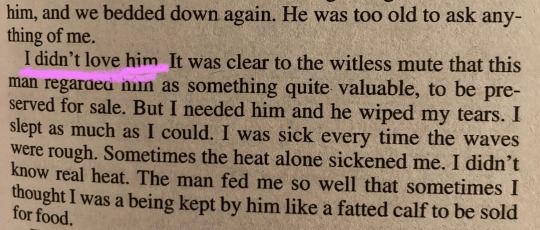
The old man who never touched him, and showed him “kindness,” Armand saying he didn’t love him.

Armand finding Marius hot lol

Armand feeling like an active participant in his sexual experience with Marius, “We began the kisses again,” not Marius did this to me.
I know a lot of people say that Armand is an unreliable narrator in this scene, which I find silly because even if he is, this is still his emotional truth about this experience, and he doesn't feel bad or exploited or like he was raped by Marius 500 years later. I think you're supposed to take the "victim's" feelings about an event into account, no?
But for the sake of argument let's look at Marius's perspective of this scene from Blood & Gold.

So Marius is pretty lost in the daddy sauce from the moment he scoops Amadeo up, his caregiver instincts take hold lol
He's truly in his element.

Marius confirms that Amadeo is quite accepting and willing with his intimacy unlike how he was with his abusers.


I see this quote thrown around a lot without context, but all you need to do is keep reading and, oh wait that's not so sinister... He literally stops wanting to die because of Marius's kisses.
I also see this line used a lot to show how "bad" this scene is.

But again, I'd argue based on everything we're shown in TVA this has more to do with religious trauma/shock then being traumatized by what Marius is doing. We know Armand does not reflect on this experience in a negative way and remembers it being pleasurable.
The immediate after math of the bath.


"He was breathing as though he were safe." and "Yet in his mute expression now I saw pure trust." And Amadeo immediately calling him "Master." To me this shows that the bath was in fact a healing experience for Amadeo, he feels incredibly safe in Marius's bed, he's not having nightmares, and he's looking to Marius as his Master already without being told or influenced to think that way. And well, yes this doesn't heal his religious trauma or bring back his memories, (I don't think even the greatest head in the world could do that) it does relax him in the moment and make him feel good, which is exactly what Marius wanted to do. I certainly don't think there's evidence to support that it traumatized him or was a negative experience for him in any way.
All this to say, I don't think you're wrong if this scene makes you uncomfortable or grosses you out. I think it's perfectly valid to have big problems with the way AR wrote about teen sexuality and age gap relationships, but what I'm sick of is people acting like I'm stupid or a pervert for not "getting it" and finding this scene appealing. I get that a situation like this involving a real minor and a real adult would be inherently traumatizing for that minor, but Marius and Amadeo are not real, Marius is an ancient vampire without a human sexuality, not an adult man using Amadeo for his own pleasure.
Just because I find their relationship kinky and appealing does not mean I lack media literacy, but if you think Armand's story is supposed to be about his trauma from being "sexually abused" by Marius, I am going to question if you are actually reading the text as it is written, or if you are projecting your own feelings of discomfort onto Armand's character and their relationship as a whole. For me the crossing of taboos is a feature of Rice's vampire relationships not a bug, I like the father/son/lover dynamic that they have.
#tvc#the vampire chronicles#marius/armand#armand/marius#tva#TVA#the vampire armand#blood & gold#marius de romanus#interview with the vampire#pro marius propaganda#meta#I guess?#yapping#yapping hours#tired might have to edit this later
123 notes
·
View notes
Text
Bill Cipher really is the funkiest little guy, isn't he?
He's a demon. He had parents. He destroyed his home dimension save for one singular atom. He was born different from the rest of his people and could see in 3D. He's a narcissistic maniac. He misses his mommy. He's a cruel, manipulative asshole. He accidentally got a little too attached and fell in love with a human, then had a drunken meltdown when they broke up. He created a throne of frozen human agony and tried to kill two twelve year olds.
He's incredibly lonely.
Personally, my biggest takeaway from The Book of Bill is the confirmation that my suspicions about him are (most likely) correct. Bill Cipher is miserable. He's been miserable since losing his family and entire home dimension, and everything he's done since then is nothing but one big attempt to distract himself from his mistakes.
Like, okay. I get that Bill is a master manipulator. He's a big fat liar, and everything he says and does is meant to be taken with a grain of salt. He wants readers and viewers to feel bad for him. He wants us to sympathize and woobify and get attached so he can use that to his advantage. BUT ALSO, I think The Book of Bill still sheds light on the fact that he IS broken deep down.
Everything that we know of Bill is almost entirely a meticulously constructed facade. He's a faker. He's all smoke and mirrors. He suffered a massive trauma (whether it happened on purpose or by accident is up for debate since he is nothing if not a horrendously unreliable narrator), and he had to find some way to cope. So he decided to live in denial. Denial of his failures, his true feelings, and, ultimately, everything that he is. He described the "entity" that destroyed his home dimension as a "monster," and, knowing what we know, that's what he believes about himself. He told Ford the answer of who that entity was would "eat [him] alive" and, in actuality, I think that was more of a thinly veiled admission that his deep-seated guilt over what he did eats him alive. Bill buried that guilt, all those negative feelings, all his mistakes deep, DEEP down, and then decided that if he was a monster, he might as well be a damn fierce one.
Bill became great at manipulation because that was the key to making his whole scheme work -- if he could control what everyone thought of him, make people fear him, bend them to his will and squeeze whatever he can out of them, he could be the meanest, nastiest, most cunning monster to ever exist, and he could keep living in denial. They can't make fun of you for your differences, for being weird (something I suspect happened to him in his home dimension) if you're the KING of weird and can kill with the snap of your fingers. If they fear you, they won't look too closely, into the tiny minuscule cracks in your facade, and see the painful truth.
Bill leaned hard into his role as Nightmare Demon to fool himself into believing all of that too.
But like I said, he's lonely. He has no one (besides his "henchmaniacs," but they're no substitute for real connection). I find it SO interesting how he speaks to Ford in The Book of Bill. "We both know you don't really want to be left alone. Admit it, you LOVE how important I make you feel. . . . [N]obody else really gets you, do they? Without me, you'll always feel unseen, surrounded by dolts who don't recognize your true potential. You've always felt alone in a crowd, haven't you? . . . you have no friends, and if you died out here in the snow, who would even miss you?" -- I think he's projecting. Those are all things that are true about himself and his connection to Ford, but he's pinning it on Ford because he can't bring himself to face it head on.
Bill Cipher is a villain. He's evil. He's a demon. He really did ALL OF THAT.
But he is also a pathetic dorky sopping wet meow meow of a character who is constantly desperately trying to run away from himself.
And now, in the Theraprism, he has no access to his usual coping mechanisms. He has no choice but to finally face reality and figure out a way to do what he's been avoiding doing for literal millennia: to just be.
#gravity falls#bill cipher#bill ci the triangle guy#the book of bill#gravity falls bill#book of bill spoilers#gravity falls meta#gravity falls analysis#book of bill discussion#my posts#billford
110 notes
·
View notes
Note
Hay it 🌞
God, I really love chapter two even when it's so short. I'm eating it whit this hands 🤌
It gives me the idea that the part of Y/N dream we see is just what she remembers in the dream. Because it happens a lot in dreams to me, i remember some parts and forget others. This nightmare is probably a memory but what about if it's not exactly the same as in real life?
It also makes me think. When you see from someone POV you see how they sees the others. For example if X thinks Y/N are dumb than most things about them will seem dumb for this person. Their face, their styles? Their speech and the way they carry themselve. It can also make X undermine Y/N's achievements and see them as easy. Because when you believe something your mind looks for signs to support that claim. If you hate someone you see them uglier then they are and if you love someone then the opposite happens. (Make me think of how the Batfamily sees Y/N 👀)
There's also something I keep thinking about. I'm not a DC fan but from what I found out is that in the comic they show us more of how paranoid Bruce is and how much effort he puts into not letting the world know his family's secret. For an example there's more than one time where he made Dick put on the Batman suit and show up at the same time and place as Bruce. He also has people who watch social media for him to see about how people see him and his family (rich people have that). I don't know if the public knows Y/N as the unwanted child they are but if they do then Bruce or at least this people working for him do.
**I also want to ask how do you prefer people askes and stuff? Do you mind them being long and stuff and what are the things you don't feel comfortable with so I don't end up crossing your boundaries.**
Thank you for reading this and happy (late?) Valentine!!!
Ahhhhh 🌞anon how are you always reading my mind😭✋ I love the unreliable narrator trope and the different POV in this chapter was me setting it up! I love playing with POVs since as you said people have different views on reality and that alters their truth, seeing that in writing is my absolute favorite thing to see so im super happy that you asked this! And about the thing with Bruce you’re totally right he’s a very paranoid man and im sorry if it wasn't clear when i wrote it but the reader does go to galas and puts on a facade to protect the reputation of the wayne family so thats why they get super anxious about it, because that was their assigned job and they are determined to see it through because to them it defines their worth. I plan on going into detail on other povs of the batfam and others like even a teacher of the reader. Sorry if the chapters are short now but they will get longer as the story goes deeper and i have more to write about story wise! As always thank you for reading and commenting, I’ll probably post rules for my asks so it’s official but overall i don’t mind any asks as long as they’re respectful and not cruel. Also i love your long asks so please don’t worry! Happy (late) valentines day!
#x reader#yandere batfam#batfam#neglected reader#yandere batboys#yandere batfam x neglected reader#yandere platonic#barbara gordon#batman#bruce wayne#damian wayne#dick grayson#duke thomas#jason todd#cassandra cain#stephanie brown#alfred pennyworth#anon ask#ask me anything
48 notes
·
View notes
Text

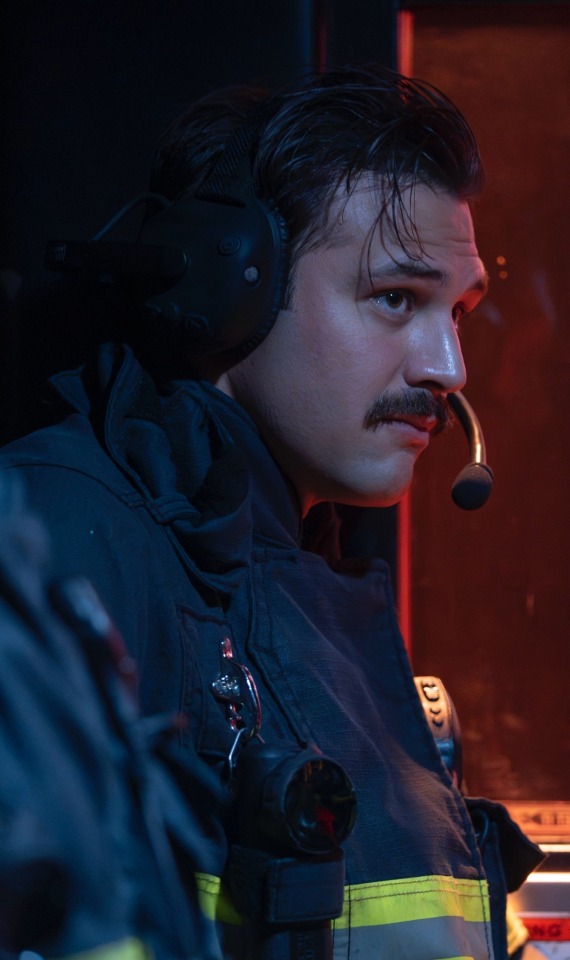
More thoughts:
I linked a post below that has me thinking about Tommy's actions & Eddie's place in the narrative. In retrospect, I 100% believe Tommy knows and understands that Eddie is likely going to be Buck's last. (as much as anybody can know this sort of thing.) I know Tim and Oliver said Eddie had nothing to do with the obstacles in Buck's relationship, but I think that was a partial truth on their part. Technically, Buck does spiral because of Abby and #stagefoureddiediaz has talked about the way Buck is still stuck on the hamster wheel. I think both of these things are part of the obstacles mentioned in one of Oliver's interviews. However, if you look only at those things, you overlook the Pink Eddie in the room. While I agree that Eddie didn't interfere or try to stop Buck & Tommy from being together, his friendship with Buck has remained a constant. (see the link at the very bottom for more about Eddie in the narrative.) If you check out Buddielifer's post, several good points demonstrate the breakup was about Eddie. I'll try to avoid repeating what was said there as I explain. My opinion does differ on a few small points, but I'll get to that later.
Ok. I'm going to talk about Tommy a little but stick with me. This is a Buddie post. I promise, and I do have a point. I do believe Buck was attracted to Tommy, not because he had some great destiny to be the love of Buck's life, but because he did a few really cool things while helping to save Bobby & Athena's lives. Plus, Tommy did it in the coolest way possible. Helicopter pilots are cool, or they would be if they weren't dating one-half of your favorite ship. lol. Before the kiss, Buck wasn't self-aware enough to fully engage with his sexuality, I suspect that he handled his attraction to Tommy the way he handled it with other men before we knew him as a firefighter.
As we saw in a flashback, when Buck met a man he felt attracted to, he processed those feelings by befriending him. It was the same with Tommy. That is why he was at the hangar that day. When he offered to buy Tommy a beer, I truly think Buck thought he was making a new friend. If you think about it, you can see this was a pattern for Buck. He did have a meltdown over Eddie when they first met (but with Eddie, bigger things were and are still in play) It doesn't change the fact that once Buck got past his initial jealousy or whatever that was, he threw himself all in with Eddie. It was part of his pattern and part of #stagefour's hamster wheel. (Endgame will have Buck get off the wheel and look around. The person standing there was never part of the wheel, but the person waiting for him to stop and get off of it.)
The situation with Tommy is probably closer to how Buck reacted to his friend who wanted Buck as a sperm donor. Buck actually followed that 'friend' to Peru. I have a post from a while back where I discuss Buck sending mixed signals. In his mind, he is making a friend, but he is also unconsciously flirting. Tommy was the first to push through and just kiss Buck. I don't think this was nefarious so much as an attempt to interpret the signals Buck was sending. (I'm sure many see Tommy as having bad intentions but stick with me. I'm trying to put him into the context where Tim claimed he wanted him to be seen. Tommy was supposed to be a mentor or a more experienced man helping Buck navigate this side of himself.) As a teacher, Tommy did help him navigate, but he also let Buck set the pace. Although never shown, we know Buck is a very sexual being, and the deleted scene with Tommy, Hen, and Karen confirmed that Tommy was just trying to keep up with him.
But I digress. Buck's intention to befriend Tommy ended the exact moment that Eddie showed up at the hangar with a huge smile on his face. Stoic Eddie who does not show his emotions was smiling hugely. Even though this is from Buck's perspective and he is an unreliable narrator, it is plausible to me that Eddie would be excited to go to a live fight in Vegas. Oliver and Tim have talked a lot over the past few weeks about how Buck spirals. When Eddie left with Tommy, Buck began to spiral in a way that we have never seen before or since. He was absolutely unhinged with jealousy. There is no way that Buck, who didn't even ask about Tommy's dating history until six months into the relationship, was that insane to get the attention of a man he has known for a few days or weeks. Now that we are pulling in new material from the current season, it isn't even remotely believable that Buck's reaction was about Tommy.
If Buck had experienced some sort of love-at-first-sight moment with Tommy, then he would have asked Tommy about his past at the beginning of the relationship. In fact, people entering into something serious generally ask about past partners in the first few weeks of getting to know each other or before sex. The fact that Buck didn't, is a change in pattern for him. Buck typically throws himself all in and then when things go wrong, he doesn't know how he got there. (Also part of the hamster wheel.) However, I attribute the difference this time to the fact that, subconsciously, Buck knows what he's feeling. He can use his body. (borderline sex addict). However, he can't bring himself to share with Tommy what he already shares with Eddie, but you know our unaware cowboy can't see it yet.
At the hangar, Tommy didn't have a feel for Buck yet. However, by the end of the Vegas trip, I think he had picked up a good idea from Eddie that there was something there. (not because Eddie has made some sort of confession, but because I'm confident that Eddie talked about Buck nonstop. I'm hoping that we get some sort of confirmation of this in the current season. I don't want it to be forgotten.) At any rate, whatever conclusions Tommy drew from his time in Vegas with Eddie and the time they spent hanging out afterward didn't bother him enough to refuse to date Buck. I do think Tommy was longing for the family and support he could see Buck has with the 118, but I don't think he was ever planning a wedding in his head. In fact, I know he wasn't. That's part of why he broke up with Buck.
Sidenote: (Thanks to StageFourEddieDiaz, for pointing out how Buck failed to understand the mission from Josh's speech because this is what caused Buck to shift from not letting Tommy get too close to asking Tommy to move in with him.) Until the conversation with Josh, Buck was actively shutting Tommy out of anything other than sex and possibly learning the ins and outs of the LGBTQ community.
Again, in the beginning, this didn't bother Tommy. He knew what Buck needed, and as he stated a few times during the sixth episode, Buck was hot and fun. If you need examples of Buck shutting Tommy out, I point you to anything that happened in the Halloween episode. I'm not saying Buck didn't care about Tommy at all, but he was holding back. The look on Buck's face as Josh asked about his feelings really said it all. I think this is probably why Josh was a little shy of the mark when giving his speech about comphet. Josh had to give a long list of, "Do you feel "this or that" for your boyfriend of six months," before he finally hit on something that Buck did feel. I don't want to get off topic or repeat too much from the linked post, I just wanted to illustrate that the jealousy from Buck's coming out episode was 100% for Eddie and that it was something that Tommy realized before entering the relationship.
I know there will be some disagreement here, but I also feel like Tommy's feelings for Buck actually were on the verge of changing, and he hadn't expected that. When they were standing at the grave, Buck gave his eulogy directed to Billy Boils. Tommy's face went through a series of changes. First, he seemed annoyed or concerned. I couldn't quite tell, but the more Buck talked, the more you could see of our Buck. The guy with a huge heart who can empathize with the skeletal remains of a criminal. I'll link the clip for you to judge. What Buck had to say to Billy was more open and revealed more about Buck's character than anything he had been saying to Tommy over the past six months. It was a small scene, but one that probably came back to Tommy when Buck suggested moving in together.
youtube
It was scenes like this one combined with Tommy's exclusion from group chat, etc., that probably helped to remind him that Buck's feelings six months ago were not about him and nothing had changed despite Buck's suggestion that he move in. Tommy's insecurities took over and reminded him what the inevitable end was going to be for them. He was the first not the last.
For the past six months, he's known that Eddie was between them, but you could see how comfortable he was with it. He didn't seem annoyed by Eddie's presence at all. I disagree with either Tim or Oliver when they try to play up that Tommy was Eddie's friend and this was natural. Eddie and Buck met Tommy at the same time, and Tommy was trying to shoot his shot by taking Eddie to Vegas. I don't know what was discussed between Eddie & Tommy during those few weeks where Buck was being left out, but it is clear that whatever conclusion he had drawn from the Vegas trip had been solidified by what happened on the basketball court, so much so that he wanted to apologize to Buck in person. We all know how that went, and I still think that was a good scene.
This brings me to the breakup scene itself. In the end, when Tommy talks about how he didn't see it coming. I don't think he was referring to the breakup. I think he was referring to the feelings he caught close to the end. He thought he would help Buck, provide a safe space for Buck to explore that he personally didn't have, and have some fun with a hot young thing, but he let it go too far. (His reasons are pretty much part of what Tim has said in interviews.) I don't think Tommy realized how much he had gotten caught up in the fantasy of Buck until Buck asked him to move in with him. I do think he's sincere when he says his heart would end up broken because, despite his feelings, he still understands there is something between Buck and Eddie even if they don't.
(One side note. I agree with Buck that first and last can be the same thing. I don't buy into the belief that you have to be with dozens of sexual partners, but I also don't think that would have been the case with Buck. He is a sexual character, and he's openly curious. I know people were mad about the interview where Oliver talked about letting Buck F#ck, but I think that would be in character for an upset Buck who was just dumped. It is less about his sexuality than it is about his abandonment issues and neglect trauma. That's my take anyway. We'll see what Tim does with it. I do think the part of Buck that craves monogamy already belongs to someone else, and the di was cast before Tommy came into his life, and we are back again to the hamster wheel.)
youtube
If you stuck with me this long, thank you. I know there are few, if any, fans of Tommy around here so I appreciate that you were willing to objectively view him the way Tim kept trying to present him. I'm tired and I'm pretty sure I rambled a couple of times, but I do understand Tommy is a problematic character. I consider that to be a writing issue that never got a satisfying resolution. I'm equally aware some people hate him simply because he was with Buck. I'm not doing a lot of judging these days because I already know how unreasonable I'm going to be over Eddie being with another man. After seven seasons of subtext, they are already in love. These other relationships are like cheating. lol I'm not so secretly hoping that if Eddie needed a "first" he got it when he was a teenager or when he was in Afghanistan.
I can tell I'm going to be bad because when I see posts about Eddie sleeping with a priest, I want to scream into a pillow and pretend that I'm flipping over furniture and tossing chairs across the room. I just can't be reasonable. I would never attack the actors or writers though. That's not me. My jealousy is on Buck's behalf, and my bad behavior remains entirely inside my head. I don't know what they'll do with Eddie, but they are going to need a chat group to make sure Eddie's boyfriends do not meet with Buck's subconscious mind.
Click here to see the meta on Eddie Haunting the Narrative from #buddielifers.
#911 abc#buddie#ryan guzman#oliver stark#buck buckley#eddie diaz#911 spoilers#speculation really#Youtube
68 notes
·
View notes
Text
alhaitham seems simple but has a lot going on deeper (aka alhaitham loves media literacy)
ok all the alhaitham discourse makes me think about how there's a mismatch between alhaitham's perception and his actual self
that difference leads to:
- his moe gap
- the way that he's seen as mean/uncaring
- ppl thinking he doesnt have a personality or temper
- his humor & wit going unnoticed
i feel like i go back and forth on how complicated alhaitham is, but it all comes down to the way that he's an unreliable narrator
(he obfuscates the truth by not including details or by distracting with non-answers, so there's just a lot we don't know for certain)
like when his "something to share" voiceline is "oh i like to go to the bar after work to relax"
and he teases traveller like "if u want to know what i think, u can just read what's on the message boards lol"
when we all know he's just playing devil's advocate with kaveh on those message boards like BRUH this is on purpose
i keep harping on how his "food i dislike" voiceline gives a weird reason for why he dislikes soup because it really shows how you cannot take him seriously at all! despite his serious demeanor and tone!
taking him at 100% face value is just asking to be made a fool of bc he was being sarcastic rip lol
but that makes him a much harder character to understand! bc you have to question everything he says about himself.
like the "feeble scholar" line was literally just a joke and he's like "lol if ya wanna waste ur time getting hung up on it go ahead"
he isn't actually serious!!

and interestingly, he also doesn't care if he's understood by other people
so he won't really bother correcting incorrect assumptions about him
and he won't stop making weird sarcastic jokes that sound serious at first bc lol he thinks he's funny so why would he stop
but its not that he /can't/ be serious. so now you have to judge every line for "ok but is this a joke or real"
and even if it is genuine, next you have to consider "what's left out" because alhaitham will not be bothered to explain himself in detail. no, figure it out yourself
and sure that level of critical thinking and meta-analysis is good to apply to characters in media, but to understand alhaitham you actually have to go that deep
you can't just be lazy about it and go with a surface-level understanding
and he does this on purpose lbr
alhaitham likes reading books bc he loves picking apart the author's perspective & figuring out biases/assumptions & placing his own takes up against the author's
so of course he would delight in forcing a reader/player/fan to have to dig deeply into how he thinks & compare to themself
sorry that's called critical thinking and if you aren't capable of that then why the heck should he stoop down to your level so he can be understood?
idk so its very fitting that he is the way he is
he is interested in learning more about himself tho, hence him wanting to use kaveh as a "mirror" for self-reflection... haitham is a scholar of his own self too!
(u can argue that thru this lens he's able to intellectualise/"explain" his emotions and distance himself from them)
but yeah alhaitham purposefully chooses to live freely as he wants and doesn't care about being understood easily by other ppl
bc like all the best books, isn't it more rewarding to have to ponder over the details & wrack your brain over what's being said
bookworm to the core fr
#genshin impact#alhaitham#meta#dev thoughts#twt crosspost#alhaitham loves media literacy#unreliable narrator#characterisation tips
61 notes
·
View notes
Note
I love KMS!!!! I really want to see more of Reader hanging out with just Topper and Kelce. Outside of Rafe, I can see the three of them being actual real friends.
Topper was an absolute sweetheart making sure she had a ride to the party, keeping her company after Rafe bailed, and is obviously a Reader & Rafe shipper. I wouldn’t be surprised if he and Cara got together to plot some Cupid / matchmaker shit. He already said he liked her when he first met her because she didn’t like the usually girls that hang around Rafe. And how he didn’t want Rafe to be an ass to her about the ride situation, Topper already have her the stamp of approval.
As chaotic as Kelce seems to be, I love that he totally had Reader’s back during truth or dare and the balcony scene. He isn’t all that bad or dumb the way Rafe makes him out to be. I just need all three of them to be real besties, not whatever the fuck relationship has with them.
Two of my other favorite series have ended, so I’m glad you have more chapters and longer word counts. Can’t wait for Sunday!!!
GIRLLLLLLLL I JUST WOKE UP AND U GOT ME ALL SMILEY AND SHIT 😭😭
And genuinely so happy you enjoy this series. When I first uploaded the first chapter I didn’t even have a masterlist post bc I didn’t expect so many sweet and kind readers appearing in my comment section and AHHHHH
so first of all, YES, love KMS!Kelce and Topper sm and sometimes I get all sad knowing they aren’t canon (especially Kelce, I made the guy a big sweetheart) 🤣
and you grasped that correctly, rafe’s the main reason for any shift in any dynamic. in his head he’s probably the alpha of their little trio but i feel like topper and kelce know damn well he’s an idiot and they just tolerate him enough to let his temper hang around lmao
so it just makes sense that they like reader. she’s kind to all of them and doesn’t just hang on rafe’s ass to get him to bend her over. she actually shows genuine (platonic) interest in them too and that’s also new for them bc usually they get ignored completely by whatever girl hangs around rafe.
so let’s just say, if rafe fucks it up, topper and kelce would still hang out with reader 🤣
and omg yes as much as rafe’s an idiot, both kelce and topper def ship reader and rafe. like they know she probably deserves better but also a girl getting to drive rafe insane in just a few days? she gotta stay.
and yess omfg cara and topper would be such a chaotic duo plotting some matchmaker stuff. i can see them planning a hangout with reader and rafe to some beach bar and then topper and cara accidentally don’t turn up so it’s just rafe and reader 🤭
AND YES TO KELCE OMFMFM. he’s probably one of my fav characters in this series and actually such a complex character like in my head i have so many headcanons about him that i always keep in the back of my mind when writing him.
but in short, KMS!kelce is basically Alex from Madagascar LMAO. big poser but with a sweet heart that just wants to connect with people.
so yeah, rafe makes kelce out to be this stupid guy but in reality rafe just has to compensate his jealousy and inferiority complex aka that’s what makes him such a funny pov to write bc he’s basically an unreliable narrator.
but then again him and kelce have this kinda sweet and bro-ish relationship in privacy bc i guess rafe actually does enjoy the feeling of support and affection but he knows kelce actually keeps his mouth shut when it matters AND GOSH I COULD WRITE A WHOLE POST ABOUT THEIR COMPLEX DYNAMIC ALONE
ok so, sorry for this long-ass reply but i just got so excited with this ask and this series is just so dear to me and KMS!reader has grown sm on me and whew i’ll be sobbing when it ends HAHAHAHAH until then YAYYYY to more of stupid rafe and silly reader
so @/my other KMS readers. FEEL FREE TO DROP THOUGHTS, COMMENTS OR QUESTIONS IN MY ASKS, I’D LOVE TO CHIT CHAT ABOUT KMS OMGMFFM
21 notes
·
View notes